




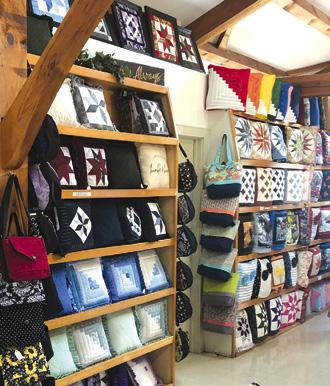


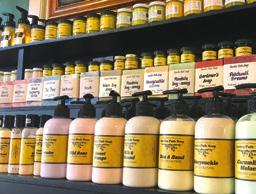


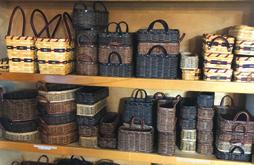
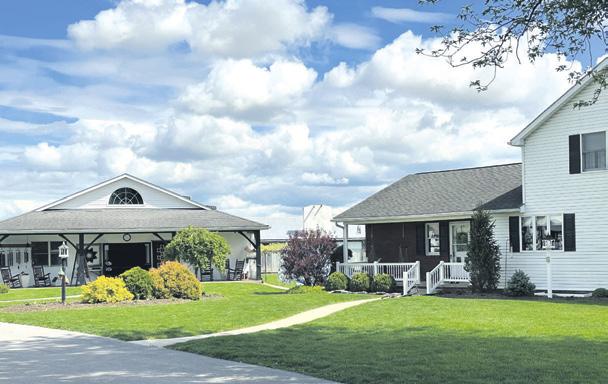
Our farm features 100 local family craft businesses offering hand made products. All locally made!
• Quilts to Brighten Your Home
Discover the beauty of Traditional Amish Quilts with wide selections of King, Queen or Single.
• Country Gifts & Crafts
The ultimate gift waits for you including souvenirs, Quillows, hand bags & purses, leather goods, things for the kids, for your baby, and more!
• Body Care
All natural body care made in Lancaster County, PA, including lotions, soaps, lip balm and more.
• For the Home
Decorate your space and bring it new light including kitchen items, home decor, pillows, lap throws, wall hangings, bird houses & feeders, brooms and more.
Mon.–Sat. 8 a.m.–5 p.m., CLOSED SUN Evenings by appointment only. For our catalog or information call

247 East Eby Rd., Leola, PA 17540
From Rt. 340 take Rt. 772 West. Right on Stumptown Rd. then right on Eby Rd.
We’re the First Farm on the Left — LOOK FOR OUR SIGN! Whether

Travelers have been traversing Lancaster County along Route 30 for well over two centuries. And for over 70 years, a very special building has signaled their arrival in Amish Country. It has a legitimate claim on being the area’s oldest visitor landmark. Most importantly, it’s the “place that made shoo–fly pie famous.” That iconic structure is the Dutch Haven windmill.
With a history dating back to the beginnings of tourism here, the building is rich in memories. From the time it started as a luncheonette in 1920 right up to the present, it has remained most famous for shoo–fly pie, served warm with whipped cream. The Dutch Haven shoo–fly pie has even been mentioned in a TIME magazine article.
Today, as soon as you walk in, you’ll be offered a free sample of that same delicious, gooey pie. Some 40,000 pies are baked annually, using the original (secret) recipe. Visitors are still encouraged to “Take one for yourself or send one to someone nice.” You can buy and ship pies home at the store or at their “online shop,” where you’ll find other local crafts as well.
Yes, Dutch Haven is much more than pies, with over 10,000 unique gift items, foods, and collectibles. Some of the most popular are jams, jellies, and canned goods, noodles, cedar chests, hex signs, quilted spice mats, Amish straw hats, jewelry and gemstones, Dutch Delft tiles, Amish dolls, onyx and soapstone animals, trivets, metal stars, Tiffany lamps, Amish romance novels, framed prints, plenty of T–shirts
and postcards, and a tremendous selection of Amish–made outdoor furniture. It’s an eclectic mix, to say the least.
As you explore, you’ll discover lots of other “surprises” around every corner. Expect the unexpected! And don’t forget the Amish–style root beer in the barrel.
Dutch Haven is now open Mondays, Tuesdays and Thursdays 10 a.m. to 6 p.m., Fridays 10 a.m. to 7 p.m., Saturdays 9 a.m. to 7 p.m., Sunday 9 a.m. to 6 p.m. and closed Wednesdays. Visit our website for information. For more info about this Lancaster County landmark, call 717.687.0111. Look forward to your free sample when you walk in under the welcoming arms of the windmill for this truly is the place that made shoo–fly pie famous.






“Ride back in time, before the car or plane was ever imagined...”
Did you know?
Aaron was Jessica’s first horse!?
Embrace the moment and travel the countryside in our locally made horse drawn Amish carriages!
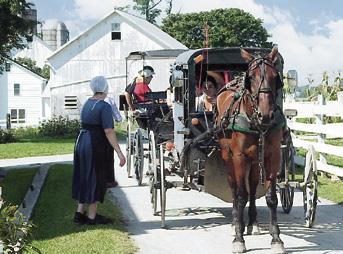
Born a small town girl, it was Jessica's dream to own a horse and carriage where she could share our lifestyle with others. She and her siblings attended a one-room schoolhouse and experienced the rigors of winter and hot summers. At the young age of 14 when her eighth grade education ended, Jessica had the opportunity to select the interior color of her buggy, choosing which style wood dashboard she wanted, and items such as a speedometer versus hand-powered windshield wiper! YES, even 30 years ago every family custom ordered the interior design of their Amish carriage. An opportunity presented at Plain & Fancy Farm to open a carriage business for visitors. In the next moment, Jessica found her favorite horse and named him Aaron, and soon began offering a carriage ride experience to travelers who were seeking to learn more about the Amish, Mennonites, and Old Order Brethren of Pennsylvania. Tracing our heritage back through Pennsylvania Dutch trails, to the Dutch Brethren of the Netherlands, Germany and Switzerland, Jessica and her dad had a new found joy of telling others about our way of life.
Today, Jessica's family lives in one of the oldest known standing homes in Lancaster County. It's now been over 31 years that the family has maintained the passion to share the Christian faith and "reasons" for living a Plain lifestyle. Within those years, Jessica and her five siblings are now parents to a combined 15+ children! Every few years another one of the children got to start learning how to drive a horse. In Lancaster County, you will see children as young as 6 or 7 years old driving their miniature pony to town!
Just as we continue to grow and develop, our communities continue to adapt to newer technology that may be permissible to utilize within the home or at work. It is important to understand that Amish and other Plain community members do not have a specific religious belief against technology. Their faith in the New Testament teaches them to follow verses such as John 15:19, to be in the world, but not of the world. No matter the progression, the simplistic lifestyle still holds strong! On our ride you'll have the opportunity to ask questions about day to day life, Don't forget to ask about the electrical sources in our homes (electrical wires are still non-existent).
In Jessica's home, and in a select few of the Plain churches, children are permitted to go to school beyond eighth grade. When Jessica had the opportunity to do local farm calls with a veterinarian, she found a love of medicine and caring for our horses.
Once she obtained her vet technician degrees, she worked five years in a horse operating room. She quickly discovered her true passion was caring for not just animals but humans also. Being the eldest sibling, she led by example and soon her next four siblings followed suit in pursuing healthcare degrees. Jessica’s sisters remain in Lancaster County practicing nursing within the local communities.
Today, you may see Jessica or her youngest sister Miriam offering buggy rides. This is your full opportunity to learn first hand about our childhood and the Christian beliefs that still hold true to us.
No matter the stage in life or agenda of the day, guests, locals (and even our drivers) find riding in a horse drawn carriage to be very relaxing! Even after thousands of carriage rides, Jessica, Sarah, Rachel, Miriam and their two brothers still love taking an evening joy ride in the carriage. When you come to our buggy ride, every ride begins with a ride through our covered bridge!
As Jessica and Miriam continue to expand our rides, we now offer many public, private and “themed” buggy rides. Inquire about scheduling your next special moment and create memories to last a lifetime!
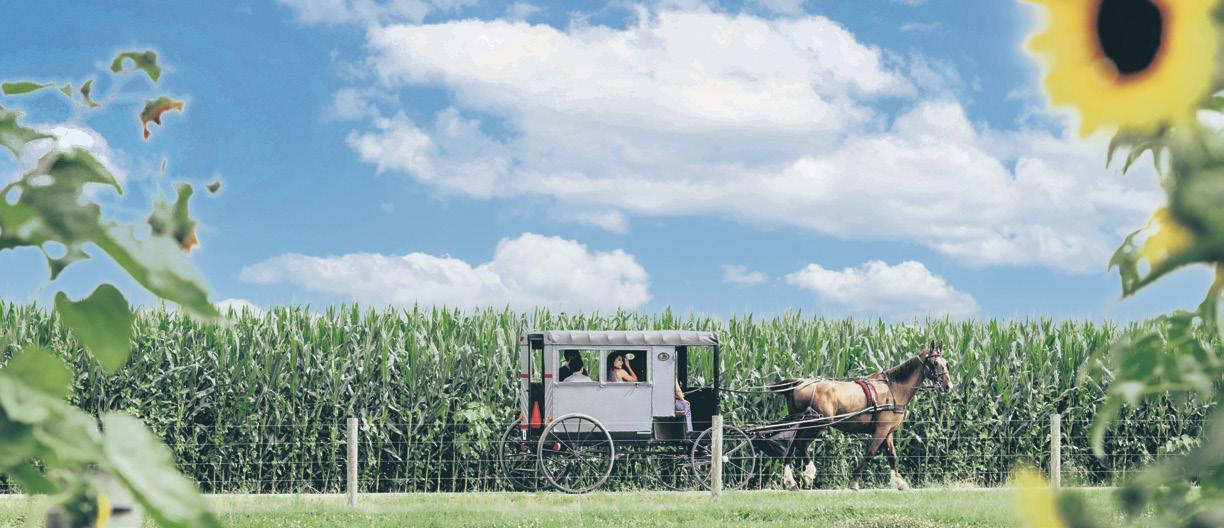
We have team carriages so your group can ride together! Group rates available for 20+ riders.
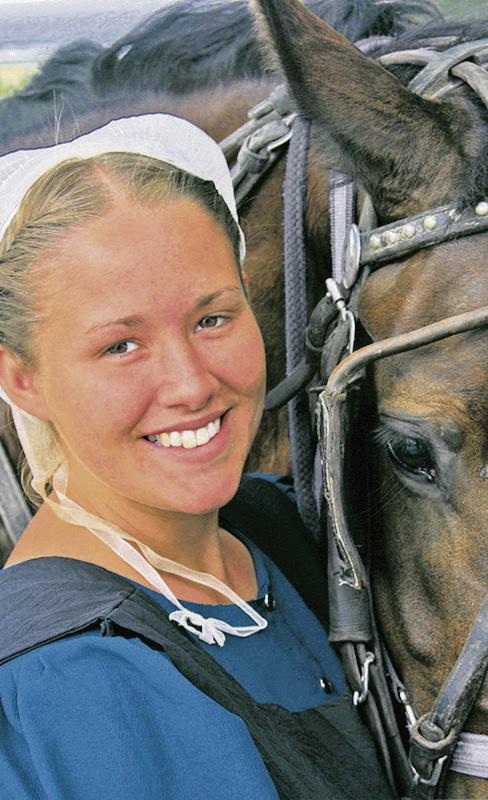








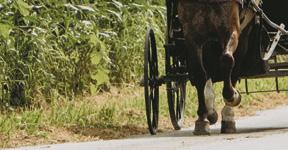

Monday-Saturday 9am-5pm, Sunday 10am-4pm*
*Last ride leaves 30 minutes prior to closing time.
Country & Cookie Tour
Adults: $18.00 Child: $12.00 (age 3-12) 2 & under: Free
A 30-35 minute tour passing a cluster of Amish homes and businesses in an all Amish area. Travel our country roads, the way we travel! Cookies, snacks and drinks are USUALLY available for purchase, depending on our Amish neighbors availability.
Adults: $35.00 Child: $16.00 (age 3-12) 2 & under: Free
A 50-60 minute tour that stops at a local farm! Experience our way of life on a real working Amish farm. Tour the barn and see the cows, chickens, goats, and horses. Discover life without electricity and how the Amish remain separate from traditional American society!
Adults: $20.00 Child: $12.00 (age 3-12) 2 & under: Free
A 30-35 minute tour passing numerous Amish farms. Our local drivers can answer your questions and talk to you about points of interest.
For a truly unique experience, book your own private tour, with your own driver, horse, and buggy. Our guests call it “ unforgettable”!


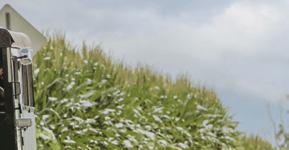
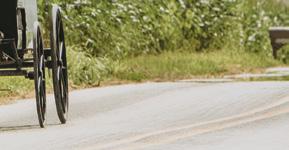









By Clinton Martin
The Amish and the Media have always been an odd pair. As much as the Amish would prefer to stay out of the spotlight, the machine that makes “spotlights” loves the Amish, as the group is just too compelling

of a subject matter to leave alone. Simply put, the Amish make for great TV, even when it is a silly spoof or an inauthentic expose.
Ever since we’ve had “reality TV,” we’ve had a steady stream of Amish “documentaries” that seemed

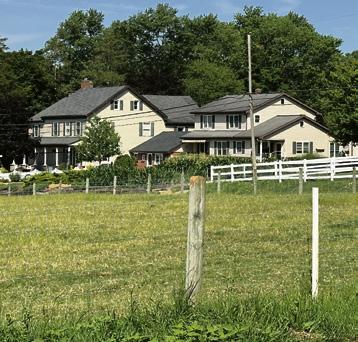
each after the other to compete for ridiculous lows. In 2004, it was a series called “Amish in the City” which basically played on a hackneyed and stilted cliché of plucking a backwoods hayseed hick and dropping them in the middle of the Big Apple, cameras at the ready to capture the “fish-out-of-water” hilarity. I didn’t find it all that funny.
When I recently saw a news report about an Amish man commuting to NYC each day, I thought I was seeing a dreaded reboot of this genre, but indeed I was wrong. This scenario is a real, authentic “Amish in the City” episode, one that captures the attention without playing for exploitation.
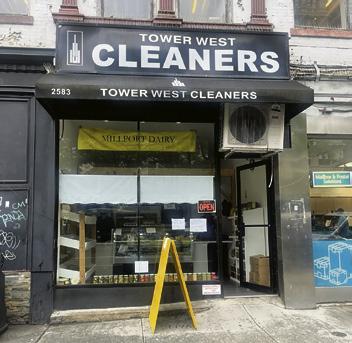
John Stoltzfus, 58 years old, could sell his produce, meats, cheeses, free-range eggs, etc. off his farm in the Lancaster County locale of Lititz, like any other straw hat-wearing, bearded entrepreneur of the Sect, like so many others in the area. But he’s chosen a non sequitur approach to selling his farm’s products, taking his product directly to the urban masses of NYC, rather than trying to attract them to his roadside stand when they are here for vacation.
Stoltzfus has opened a retail store on the Upper West Side, on Broadway between 97th and 98th Streets, which he staffs Wednesday, Thursday, Friday, and Saturday. He leaves
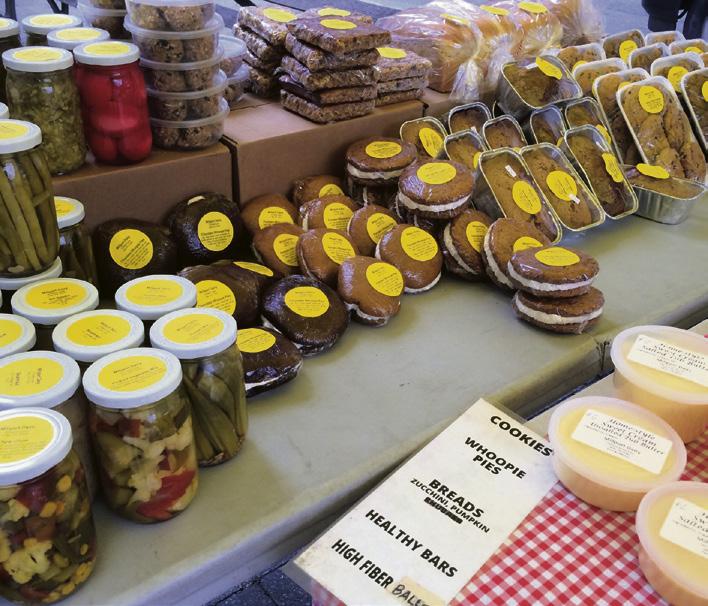
Lancaster County at around 3:00am, with a hired driver who not only takes him to NYC, but also transports goods from Stoltzfus’ farm, which is then sold at the store. It takes about 3 hours to get from his home to the store, which he has open from 7:00am to 4:00pm. He arrives back home again a little after 7:00pm.
So, how does an Amish farmer wake up one morning and decide to open a brick-and-mortar, retail store in New York City? Well, it didn’t just happen, at least not like that. Stoltzfus had already been selling his farm’s products through various farmers markets and gourmet stores in the five boroughs for nearly 20 years, basically selling wholesale to middle
men who then sold to retail customers. His products proved to be popular, and his farm, Millport Dairy, had become a well-known and sought-out brand name in the city. His idea to cut out the middle men and sell direct to consumer, even if it meant a 6-hour roundtrip commute, was not totally out of the blue.
He carefully phased out his product line with the wholesalers, and diligently looked for an available space that made sense in the city. What he found was a dry cleaner who was going out of business. He leased the space after they moved out and has been there since the beginning of the year. While he is the face of the business, the farm wouldn’t function without the whole family. Everyone gets involved with making things for the store. The ladies make the baked goods. The boys collect the eggs (both

duck and chicken varieties) and others, including Aunts and Uncles help raise the other animals which leads to meat, cheese, yogurt, even chorizo sausages.

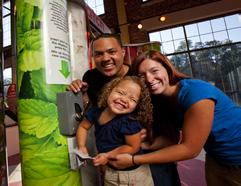

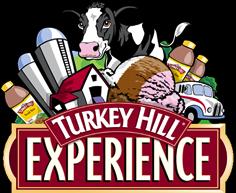

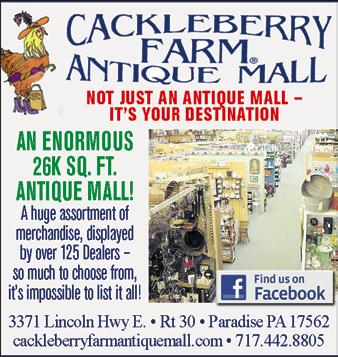
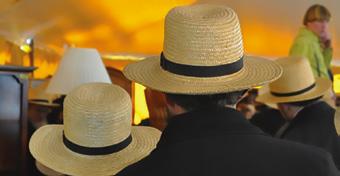




By Ed Blanchette

o you enjoy searching for antiques? Perhaps you are looking for that special something, or you just enjoy searching for a surprise to add to your home decor. Maybe you hope to find an
item worthy of an “Antique Roadshow.” Whatever you discover, once you find it, it becomes your personal treasure.
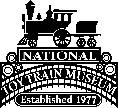



What makes Lancaster County such a great place to go antiquing? One obvious answer would be that this area has a rich history going back hundreds of years to the first settlers in the early 1700s. Many of us have stuff in our attics that we have forgotten about, or inherited. Who knows what may be out there either at a yard sale or an antique shop? Here in Lancaster County we boast thousands of antique shops and dealers. The Adamstown area alone has over 3,000 antiques dealers, and is known as Antiques Capital, U.S.A. The many locations stretch out along Route 272, just off Pennsylvania Turnpike, Exit 286.
Whether you are after a rarity, or just something old that intrigues you, you’ll find everything from sheet music to music boxes, pocket watches to kitchen sinks, nostalgic clothes to beautiful wardrobes to hang them in. Glassware, crafts, toys, clothes, artwork, china, quilts and fabrics, memorabilia...the list is endless!
By Clinton Martin
Two years ago, I wrote about Aaron and Abner Zook, two Amish brothers who became prolific visual artists, creating three-dimensional carved wooden “paintings.” In Abner’s 2010 obituary, it was noted he had created over 800 of the famous dioramas, depicting rustic Amish country life.
It turns out that Abner’s son Joel was an apple that didn’t fall far from the tree. Joel Zook also took an interest in folk art. Rather than doing exactly what his father had done, he took more of a “miniature-building” approach. Joel Zook built scale models of

carriages, wagons, surreys, and buggies. His most famous builds were meticulously recreated Conestoga
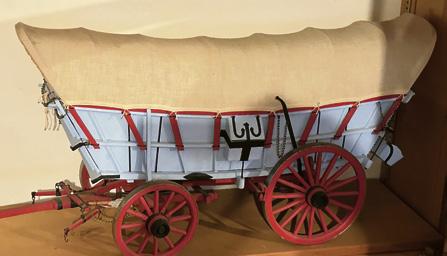
Wagons. His first ever Conestoga Wagon was crafted in 1987. One of his Conestoga Wagon models sold for
over $5,000 at auction in 2023. There weren’t many made, and each one is a “one of one” but occasionally a collector will decide to part with one at auction.
The Conestoga Wagon was the semi-truck of the preautomotive age in America. Traversing the country from east to west and north to south, these sturdy behemoths were first invented and produced here in Lancaster County, making them one of our iconic claims to fame. Joel Zook made most of his miniatures in the 1990s. Besides Conestoga Wagons, he
Zook cont’d on page 22

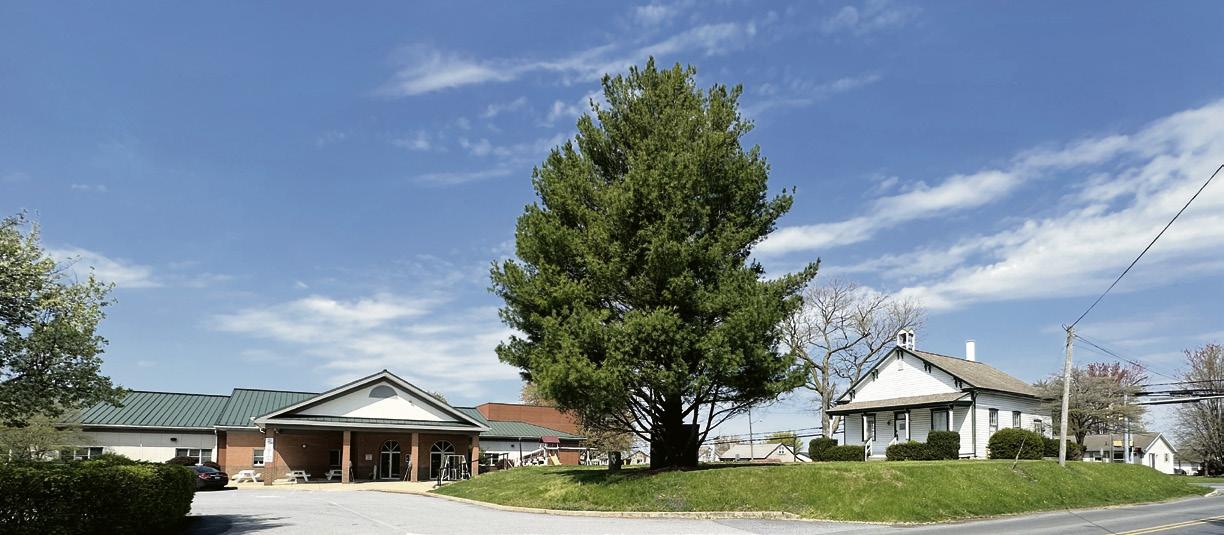
By Clinton Martin
Pequea Valley School District closed its Leacock Elementary School building in 2009, leaving the medium-sized building on the eastern edge of the village of Intercourse empty. It
1.45 million dollars and used it for both a church and a school. A year later, a local Anabaptist mother was inspired to ask about renting the remaining unused space in the building for a facility to help
have a safe environment to go to when she needed a break.
Anabaptist refers to a collection of churches (Amish, Mennonite, Brethren, and various other smaller groups.) As

We're excited to invite you to dive into the world of natural health through our teleseminars, listed below. With 48 years of experience under our belt, we promise these sessions are not only enriching but entirely free! Designed to fit into your schedule seamlessly, you can call to listen at any time during the month. And there's a cherry on top: stick around until the end, leave us a voicemail, and you'll receive a special gift valued at $9.99, just as a thank you from us to you for tuning in. Don't miss this opportunity to empower your health journey with knowledge that's been decades in the making!
Step 1: Call 1-888-929-5963
Step 2: Press 1
Step 3: Leave your name and address at the end to receive a FREE gift just for listening
Step 1: Call 1-877-831-7474
Step 2: Press 1
Step 3: Leave your name and address at the end to receive a FREE gift just for listening
Step 1: Call 1-844-601-6767
Step 2: Press 1
Step 3: Leave your name and address at the end to receive a FREE gift just for listening
Step 1: Call 1-833-499-1515
Step 2: Press 1 Step 3: Leave your name and address at the end to receive a FREE gift just for listening Breathe Easy: Navigating the World of Allergies
Step 1: Call 1-833-924-4446
Step 2: Press 1
Step 3: Leave your name and address at the end to receive a FREE gift just for listening
Step 1: Call 1-833-882-2774
Step 2: Press 1
Step 3: Leave your name and address at the end to receive a FREE gift just for listening
Step 1: Call 1-844-490-4478
Step 1: Call 1-877-847-7979
Step 2: Press 1
Step 3: Leave your name and address at the end to receive a FREE gift just for listening
Step 2: Press 1 Step 3: Leave your name and address at the end to receive a FREE gift just for listening Pathway to Parenthood: OvercomingTogetherInfertility
For over 250 years, visitors coming into Lancaster County from the east on Route 30 have traveled through a small town known as Paradise, just one of the many intriguing town
names in the area. Officially, Paradise Township adopted the name during its organization in 1843.
Different sources credit different people with naming the area. Some

say that the name Paradise was given by Joshua Scott, who later became known for his map of Lancaster County. Standing in the middle of
Paradise cont’d on page




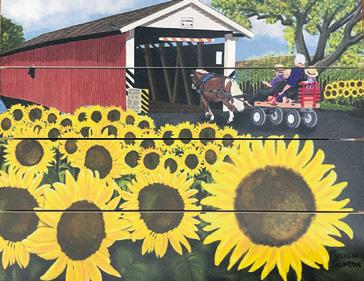

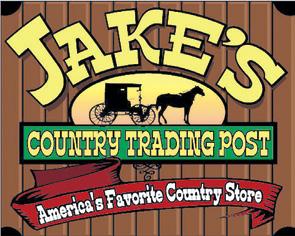
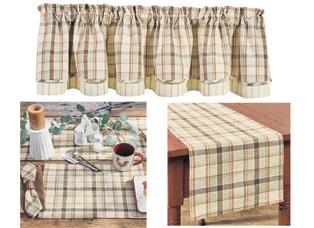






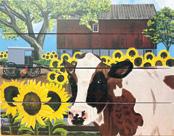
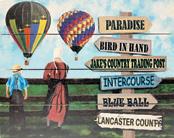




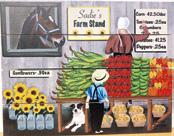
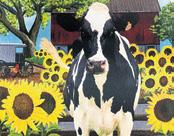



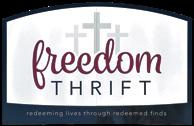


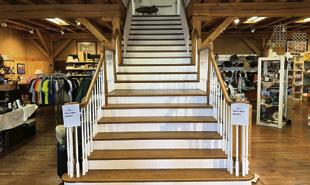
By Abbey Ginder
By all appearances, Freedom Thrift looks like any other thrift store, but our mission makes us different. Proceeds from your purchase directly support Revelations of Freedom Ministries (ROFM), uplifting and empowering men who are struggling with addiction. ROFM guides these men to become disciples of Christ. Teaching

and glorify God, while managing their life based on Biblical principles. As part of ROFM’s life skills program the men work at Freedom Thrift. They aren’t just sorting donations; they are building a future. In 2021, CEO Tom Carr started the Life Skills program to show the men their value to the ministry. They gain valuable job skills such as time management, teamwork, initiative, and accountability which can be added to

their resume. The men learn to take pride in their work and are actively participating in their recovery.
Our New Holland location, located at 114 Ranck Church Road in New Holland, PA boasts two buildings in one location! The front building holds housewares, lighting, candles, linens, books, craft supplies, furniture, and more. The back building is clothing, shoes, jewelry, and luggage. You’ll find ample parking in front and behind the buildings. We are committed to building on the success of the store to benefit the ministry. Freedom Thrift on RT30E, located at 2853 Lincoln Hwy East in Ronks, PA, next to Dienner’s Family Restaurant, boasts a recent promotion. Store associate Lisa Kneisley has stepped up to become the new manager. The store has two floors to explore with new items added daily. You can see their latest ad accompanying this article.
Ready to find a hidden gem and support a worthy cause? Look no further than Freedom Thrift!

CACKLEBERRY FARM ANTIQUE MALL IS CELEBRATING THEIR 27TH YEAR! Located at 3371 Lincoln Highway East, Paradise, Pennsylvania, on Route 30. Four miles west of Route 41 and only six miles east of Rockvale Square Outlet Mall. They are only minutes away from everywhere and everything Lancaster County has to offer. It's Not Just an Antique Mall –It’s Your Destination!
WITH OVER FIVE MILLION DOLLARS OF INVENTORY, their huge 26,000 square foot facility houses a wide variety of antiques and collectibles, displayed by over 125 dealers featuring fine items such as: furniture, glassware, Railroad, Mining and Fire Fighting Memorabilia, coins, sterling silver, clocks, advertising, jewelry, fine china, toys, books, postcards, trains, Christmas, pottery, linens, primitives, kitchenware & much, much more! It is impossible to tell you everything they have to offer. You will be amazed at the quality selection.
HOUSED INSIDE THE ANTIQUE MALL, IS AN OLD TIME GENERAL STORE, which will take you back in time to the Mom & Pop stores of years ago. With a wide variety of antique and collectibles including Pharmacy, Tool Supply, Barber Shop, Hardware Store, Haberdashery and more!! They offer convenient parking for over 100 vehicles, with a spacious area for campers, trailers, and tour buses. You will find it such a pleasure to shop in their clean, climate-controlled, brightly lit and carpeted mall. Absolutely one of The Best shopping experiences in Lancaster County!
OPEN ALL YEAR: MONDAY THROUGH SATURDAY 9:30 AM to 5:00 PM, SUNDAY 10:00 AM to 5:00 PM, closed on Tuesday. Visa / MasterCard / Discover / Debit Cards accepted. Gift Certificates, Layaway and Shipping Available. For more information call: (717) 442-8805 during business hours or visit us on at CackleberryFarmAntiqueMall.com.
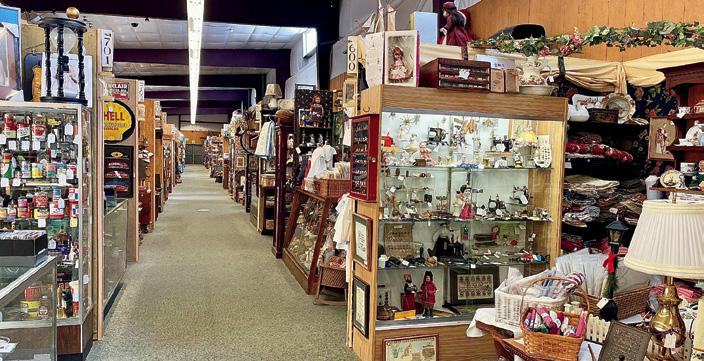

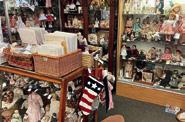

We have everything Lancaster County has to offer Come explore our huge 26,000 square foot antique mall—filled with the finest selection of antiques and collectibles in Lancaster County Pennsylvania! It houses a huge assortment of merchandise by over 125 dealers. There’s so much to choose from it’s impossible to list it all. And don’t miss our old time general store that’s full of vintage merchandise for sale.



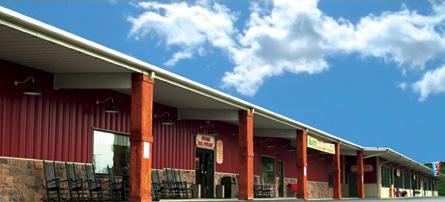

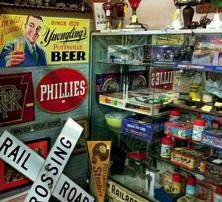
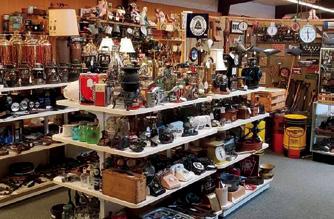


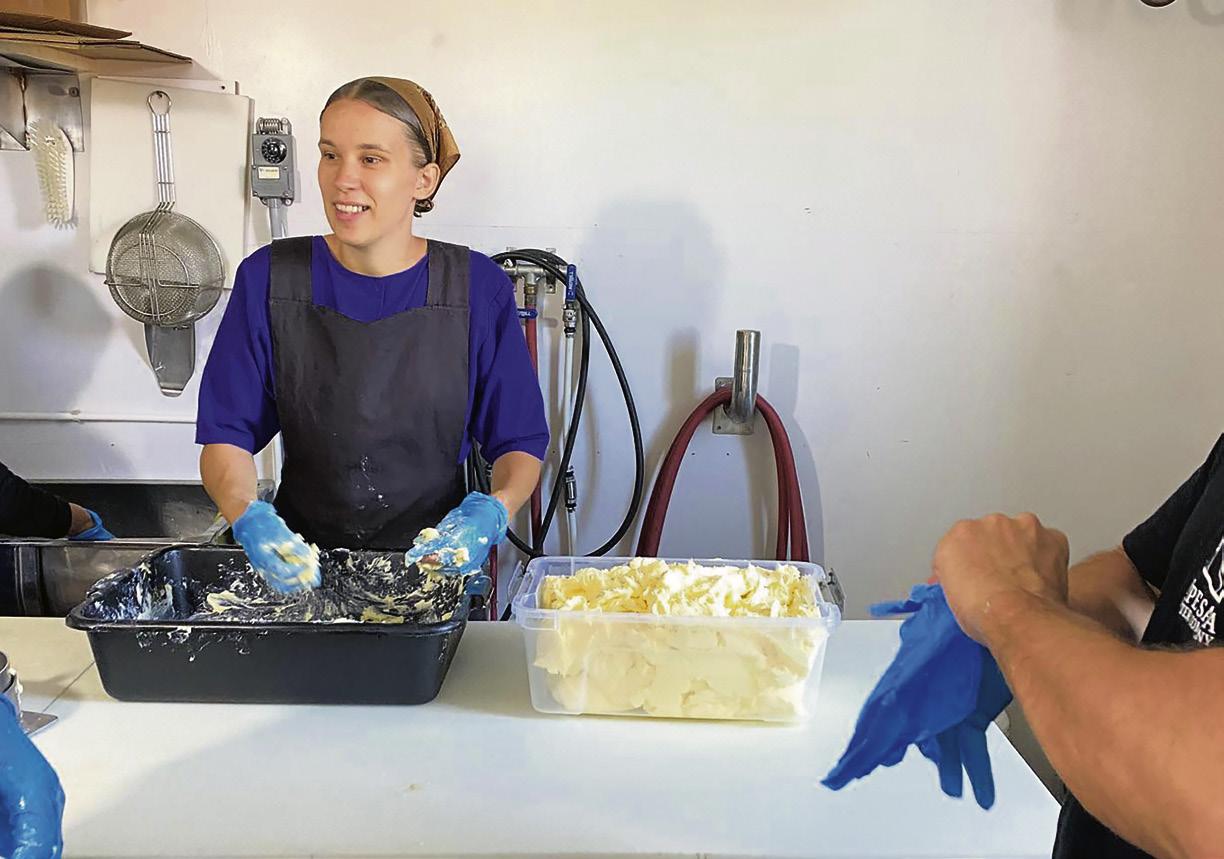
By Clinton Martin
Iwas reading a publication mostly circulated among the Amish, and the help-wanted section contained the usual opportunities… construction trades, farmers market stands, bakeries, but then one tiny listing really caught my eye. “Help wanted to pack cultured butter for Pepe Saya in York County.” Naturally, I wondered who is Pepe Saya? A few nanoseconds on the Internet turned up a fascinating story.
Pepe Saya is an Australian butter company, which specializes in “beautiful tasting cultured butter.” The company started in 2009 (in Australia, naturally.) In 2010, they sold their first “round” of butter. The company grew and expanded from there, but in 2024, the company, having grown into a globally exporting brand, opened a facility here in America – in York County, Lancaster County’s neighbor to the west.

At the facility, largely staffed with Amish workers (mostly ladies) their cultured butter rounds are being kneaded, placed into molds to form the proprietary round shape, packaged for retail and labeled. The butter brand’s slogan is “The Round Butter With The Head On It” (as a cartoon visage of Pepe features on the label.)
So, does the Pepe Saya company milk cows in Australia, and ship the milk to York County PA? No of course not. The American product comes from here, using Pepe Saya’s process and recipe. To explain what “cultured butter” is (as opposed to any other butter you’d see on the grocery store shelf) I’ll let the company itself handle that. “The difference in our butter is the process we go through to make it. The butter is beurre de baratte (butter of the churn)—it is batch churned from single
origin cream, creating a natural and less processed product.
When the beautiful local cream arrives from the farms to the creamery at Gap View Farm in Pennsylvania, we heat up the cream and inoculate it with a lactobacillus culture. We then let the cream culture, allowing for a full buttery taste and slight tang to develop, creating the unique flavors of the cultured butterthis is our crème fraiche. The crème fraiche is then churned, which produces our buttermilk and of course the butter.” If trying some Australian-style cultured butter, churned by Amish in Pennsylvania, is a food journey you’d like to take, look for the “rounds” at your local grocery store, or go to Pepe Saya’s website and you can have some shipped to your home. www.PepeSaya.com (They currently ship to addresses in PA, NY, and CT.)
Amish VIP (Visit–in–Person) Tour
717–768–8400 | AmishExperience.com
Anna’s Gifts & Sundries
800-669-3568 | MillersSmorgasbord.com
Country Lane Furniture
717–867–5701 | CountryLaneFurniture.com
Tuesdays & Thursdays Till 8:00PM
Crystal Cave 610-683-6765 | CrystalCavePA.com
Saturday & Sundays Till 6:00PMPM
Dutch Apple Dinner Theatre
717–898–1900 | DutchApple.com
Dutch Haven
717–687–0111 | DutchHaven.com
Gish’s Furniture
717–392–6080 | 717–354–2329 | Gishs.com
Good’s Store
“Weekdays Only” | GoodsStores.com
Hershey’s Chocolate World
717–534–4900 | Hersheys.com
Jake’s Country Trading Post
717–687–8980 | JakesHomeAccents.com
Locally Made Food Shop
717-687-6621 | LocallyMadeFoodShop.com
Miller’s Smorgasbord
800–669–3568 | MillersSmorgasbord.com
Shady Maple Farm Market
717–354-4981 | Shady-Maple.com/farm-market/ Shady Maple Smorgasbord 717–354-8222 | Shady-Maple.com/smorgasbord/ Smokehouse BBQ & Brews at Plain & Fancy Farm 717–768–4400 | SmokehouseBBQandBrews.com
Village Greens Miniature Golf
1444 Village Road, Strasburg, PA 17579
717–687–6933 | VillageGreens.com
Water’s Edge Mini Golf
717–768–4653 | WatersEdgeGolf.net
For Plain People, Sunday is a day of rest, but there are many things to do in Amish Country on Sundays.
Save some of these for your Sunday sight–seeing.
Aaron & Jessica’s Buggy Rides
717–768–8828 | AmishBuggyRides.com
Amish Experience
717–768–8400 | AmishExperience.com
Anna’s Gifts & Sundries
800-669-3568 | MillersSmorgasbord.com
Cackleberry Farm Antique Mall
717–442–2600 | CackleberryFarmAntiqueMall.com
Choo Choo Barn
717–687–7911 | ChooChooBarn.com
Crystal Cave 610-683-6765 | CrystalCavePA.com
Dutch Apple Dinner Theatre
717–898–1900 | DutchApple.com
Dutch Haven
717–687–0111 | DutchHaven.com
Hershey’s Chocolate World 717–534–4900 | Hersheys.com
Jake’s Country Trading Post
717–687–8980 | JakesHomeAccents.com
Julius Sturgis Pretzel Bakery
717–626–4354 | JuliusSturgis.com
Locally Made Food Shop 717-687-6621 | LocallyMadeFoodShop.com
Miller’s Smorgasbord 800–669–3568 | MillersSmorgasbord.com
National Toy Train Museum 717–687–8976 | TCATrains.org/museum/ The Quilt Shop at Miller’s 717-687-8439 | QuiltShopAtMillers.com
Renninger’s Antique Market 717–336–2177 | Renningers.net
Smokehouse BBQ & Brews at Plain & Fancy Farm 717–768–4400 | SmokehouseBBQandBrews.com
Strasburg Scooter Tours
717–876–5560 | StrasburgScooters.com
Strasburg Train Shop
717–687–0464 | ETrainShop.com
Turkey Hill Experience
844–847–4884 | TurkeyHillExperience.com
Village Greens Miniature Golf
1444 Village Road, Strasburg, PA 17579
717–687–6933 | VillageGreens.com
Water’s Edge Mini Golf
717–768–4653 | WatersEdgeGolf.net




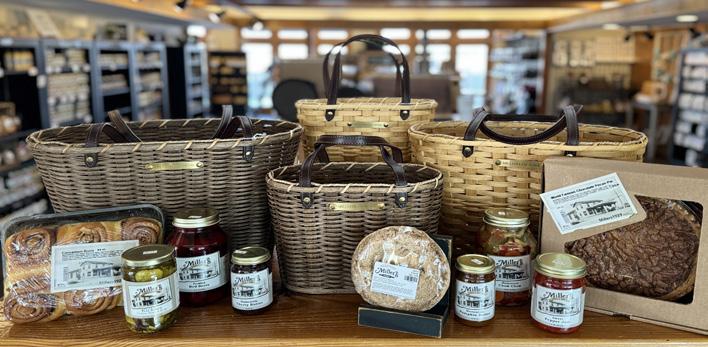




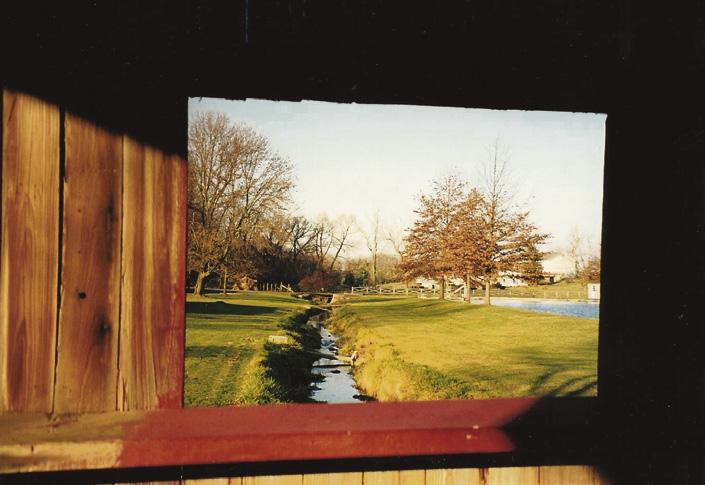
By Brad Igou
Here in Lancaster County, over 45,000 Amish (pronounced Ah-mish) serve as living reminders of a quieter time, a time when the horse and buggy was the mode of transportation and families lived and died in the same small communities.
The first Amish, so named for Jakob Ammann, arrived in Lancaster County and nearby Berks and Chester counties in the early 1700s to take part in William Penn’s “Holy Experiment” of religious freedom in Pennsylvania.
Originally called Anabaptists, they came to America from Europe to escape religious persecution by both Protestants and Catholics. For this reason, while they are Christians, most do not consider themselves to be either Protestant or Catholic. The county is now home to three Anabaptist groups called the Amish, Mennonite, and Brethren.
In 1525, after the Reformation, a group of Swiss Brethren felt that only adults should be baptized. They met secretly in a member’s home and

confirmed their faith by re-baptizing each other as adults, even though they had been baptized as infants in the state church. Thus, they became known as Anabaptists, which means re-baptizers.
Because of their beliefs in adult baptism, non-violence, and separation of church and state, they were viewed as “radicals,” and thousands were tortured and killed in the following years. Sometimes referred to as the “Radical Reformation,” the religion nevertheless spread into other areas of Europe. In time, the different Anabaptist groups became known as Mennonites, after the greatest of the Anabaptist leaders, Menno Simons.
It was in 1693, after a time of some controversy in the church, that Ammann broke away to form a group he felt more strictly adhered to the founding beliefs and practices of the first Anabaptists.
The differences between the various Amish, Mennonite, and Brethren groups are their interpretations of the Bible, their uses of modern technologies such as
automobiles and electricity, the values they place on education, their uses of English, and their degrees of interaction with outsiders.
The Amish believe that “worldliness” keeps one from being close to God, so they choose to live without many modern conveniences and technology, such as cars, television, videos, etc. Rather than use electricity off the grid for appliances and machinery, they have propane stoves and refrigerators. The Amish are not opposed to something because it is new or modern, but rather concerned about what influences and impact such things may bring. Likewise, uniformity and plain dress have for generations indicated humbleness, a lack of interest in worldly fashion, and a commitment to the Amish way of life.
They do not live in seclusion from the rest of the world. Amish farms can be seen interspersed with modern farms throughout the countryside, and there is much daily interaction between the Amish and the non-Amish (“English”) community, especially for those Amish “cottage industries” which produce and sell items such as quilts and furniture to the “English.” In fact, today in Lancaster, less than half of the Amish make their living off farming, due to the scarcity and high price of farmland, as well as the low prices for milk, and the rapidly growing Amish population (the Amish population is estimated to double every 20 years.)
Contrary to popular belief, the Amish do not live the same way they did 300 years ago. They have adopted many things to make life easier but are careful not to accept new technology without considering its effects on their family, community, and religious beliefs.
“Amish” is, therefore, a religion. Respect the belief against photography. Remember that the Amish are not saints or holy people, nor are they actors or curiosities to ride around and take pictures of. They are people, like you, who have chosen a particular religion and lifestyle while trying to navigate the ever changing waters of modern technology and the influence of the media. For those of us who live here, they are also our friends and our neighbors.
families in Lancaster County of the same background who were eager for a place to bring their special-needs family members for a respite from their day-to-day care.
By May 2011, the Community Care Center had opened in rented space in the former Leacock Elementary School. At first, the center was open on Fridays, and all the staff were volunteers. In 2012, Tuesdays were added. By 2014, the center was open three days a week, and the caregivers were now paid staff. (It was determined that asking someone to volunteer their time three days a week was unreasonable.)
Today, the center caters to students with many levels of ability and disability. Many are wheelchair dependent, some are nonverbal, there are autistic youth, attendees with Down Syndrome, and others. To ensure each person receives the appropriate care, best level of preparation, and ideal scheduling of activities, the youth are organized into various groups. Nicknames like the “Penguins,” the “Dolphins,” or the “Starfish” denote which group they attend. The Amish in particular are used to youth groups going by nicknames, as mainstream Amish youth join a “gang” when in Rumspringa which often describes how conservative or “liberal” (in the Amish sense) the youth are.

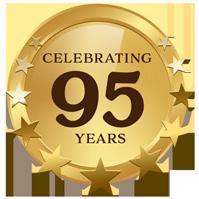
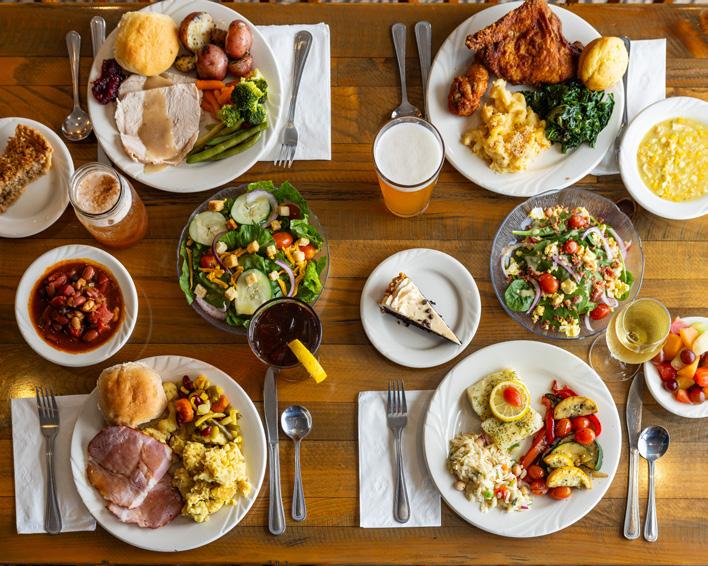
Since 1929, Miller‘s has cooked from scratch and created dishes that you’ll go home and tell your friends about. This includes Lancaster County PA Dutch favorites and fresh baked desserts.
Buffet Dining OptiOns: Lancaster’s Traditional Smorgasbord OR Soup, Salad & Bread Smorgasbord O pen 7 D ays a W eek Reservations Strongly Encouraged|Walk-ins Welcome Reserve Online at Millers1929.com or call 717-687-6621.
Voted a LNP Lancaster County Reader’s Choice Buffet 2023, a 2023 USA TODAY 10Best Readers’ Choice Best Buffet in the US, TripAdvisor’s Travelesr’ Choice 2023, and a Lancaster’s Best Buffet by Clipper Magazine 2023.
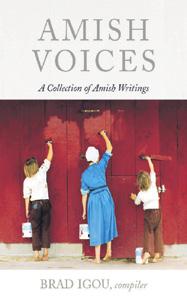

Valid for up to six adults selecting our Traditional Adult Smorgasbord Dinner. Not valid Saturdays after 3 PM. Not valid Easter, Mother’s Day, Thanksgiving, or with any other offer, special, discount, birthday offer, Bonus Bucks or group rate. Applies to Traditional Adult Smorgasbord Dinner only. Not valid on any other dining option. Expires 8/15/24. PLU ACN704

WITNESS the emotional story of an Amish teenager's struggle in Jacob's Choice, where he must choose between his faith and the modern world. 3–D sets, special effects, unique "ghost–like" characters, all on five screens.
EXPLORE the Amish Country Homestead, the region’s only Officially Designated Heritage Site Amish home then sit at a desk in the Fisher Amish Schoolroom furnished authentically with desks and more from an actual Amish classroom.
TOUR the magnificent back roads through Amish Farmlands with a certified tour guide in complete comfort onboard one of our 14 passenger busses.
SATISFY yourself that you’re making the most from your Amish Experience. Since 1959, the area’s first, and still foremost, interpretative source of Amish Culture.

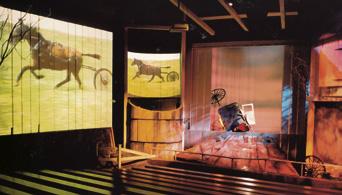


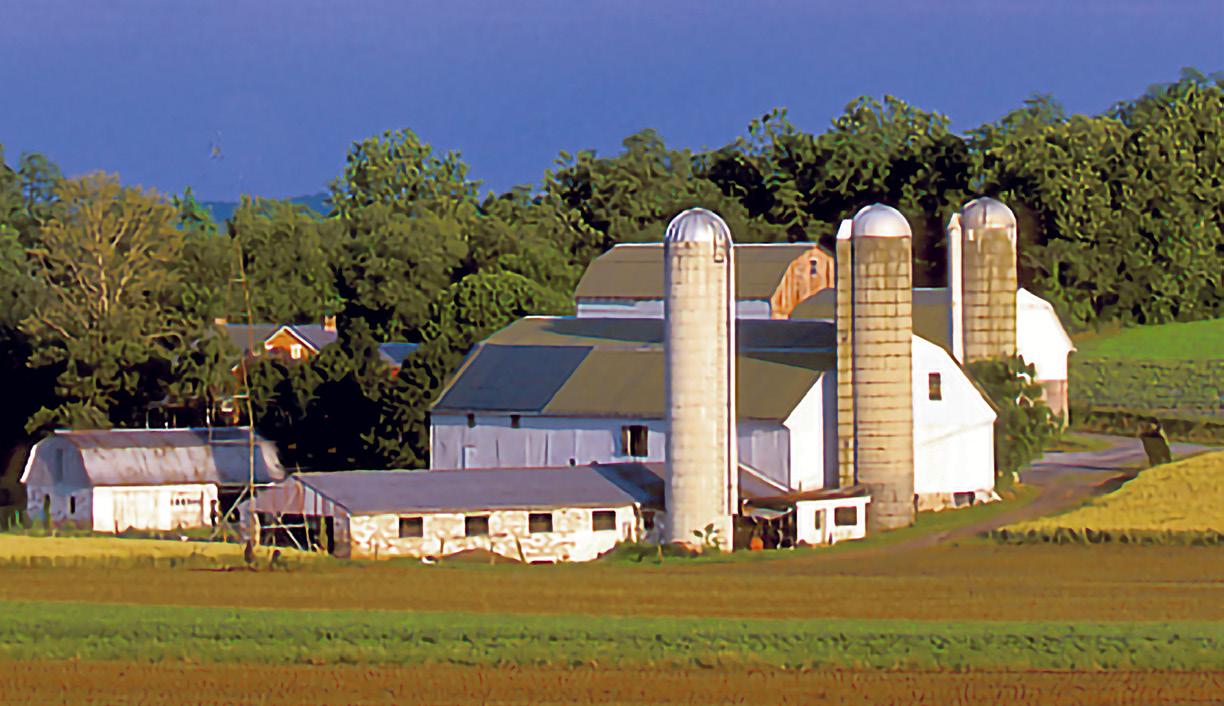
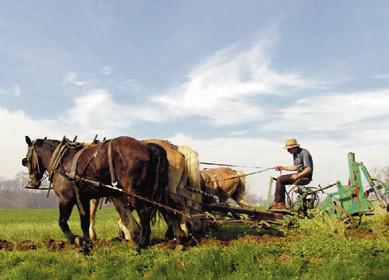
Journey along back country roads, deep into the Amish Farmlands to discover sights rarely seen. Under the watchful eye of your certified guide, you’ll gain insights into the “how” and “why”of an ever–changing culture, and see at–the–moment activities of the Amish. If you’ve seen the Amish portrayed on the various “Reality” TV shows, and you wonder what really is true and not true about the Amish, this is the tour you won’t want to miss! We’ll debunk myths about the Amish and provide accurate, respectful, and authentic information, just like we have done for over 60 years.
Duration: 1 1/2 hours
Mon.–Sat. 10 a.m., 12 p.m., 2 p.m., 4 p.m. Sun. 12 p.m., 2 p.m., 4 p.m.


Rare is the opportunity to meet with Amish families willing to share their traditions and beliefs with you. In a group whose size is never more than 14, this is the only Amish Tour to be designated an official “Heritage Tour” by the County of Lancaster. Visit an Amish farm at milking time, stop at a Cottage Industry, and finally enjoy a visit and chat with one of our Amish friends in their home.
Duration: 3 hours Monday – Saturday 5:00 p.m.
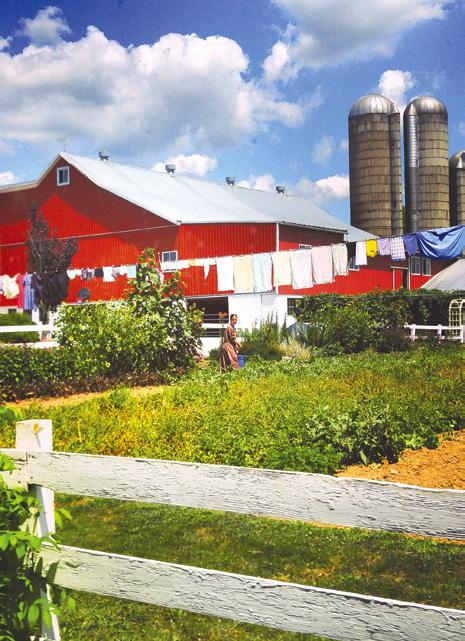

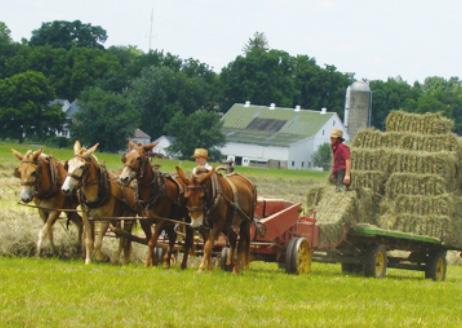
The SuperSaver Package includes the Amish Farmlands Tour, the acclaimed “Jacob’s Choice” at the Amish Experience F/X Theater, and a tour of the Amish House & One–Room School.
Drive along the area’s only AAA Scenic Cultural Byway, and when you’re mid–way between Bird–in–Hand and Intercourse, you’ll discover the ten pristine acres known as Plain & Fancy Farm, and home of the Amish Experience Theater, Country Homestead, farmlands & VIP tours, buggy rides, shopping, restaurant and hotel.
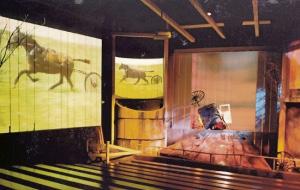
Discover what it means to be Amish through an immersive film as you become part of the emotional struggle of the Fisher family to preserve more than 400 years of Amish traditions. Five viewing screens, a unique barnyard setting and special effects create a one–of–a–kind experience.
Journey down rarely traveled back country roads, deep into the farmlands, to discover the sights sought after by visitors. Gain insights into the hows and whys of an ever–changing culture from certified guides in mini–shuttles. Stops may include a roadside stand, quilt shop, country store or craft shop on an Amish farm.
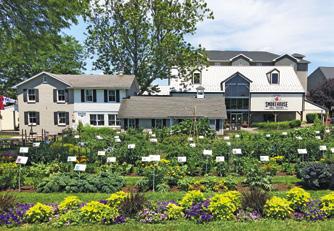
Visit the only officially designated “Heritage Site” Amish house. As you walk through the nine rooms with your guide, unravel the riddle of Amish clothing, life without electricity, and eight–grades–in–a–room education as you sit at authentic Amish school desks.

This officially designated “Heritage Tour” is a rare opportunity to meet and talk to the Amish personally. On this exclusive tour you will go right into the barn on an Amish farm at milking time, visit with an Amish artisan at his workplace, and then enjoy a personal visit and conversation right in an Amish home.
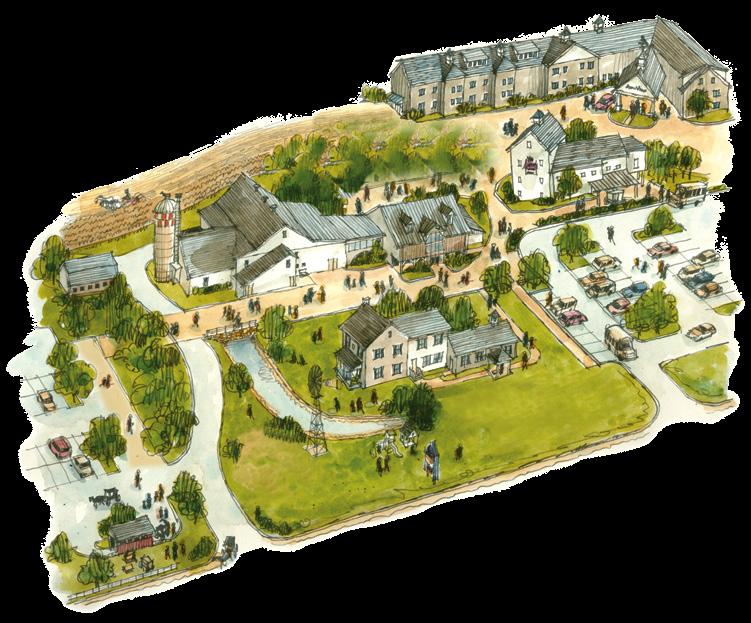
Aaron & Jessica’s drivers are happy to share life stories and answer questions.
Smokehouse
Please see right hand page.
Find books, DVDs, candles, toys and dolls, kitchen and home items, souvenirs, local handcrafts, Amish clothing, straw hats, bonnets, and last but not least...tasty treats.
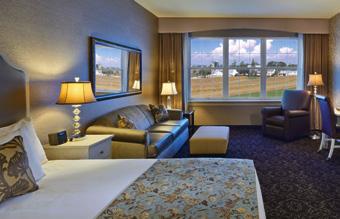
Rated The Best Hotel in Lancaster County
The place for the perfect adult-only getaway or family vacation with indoor pool, hot tub, fitness center, and hot hearty breakfast. Our rooms and suites all feature kitchenettes, and many rooms feature clawfoot soaking tubs, and farmland views.
Adult-Only AND Kid-Friendly Buildings
The family-friendly East Building includes a wide array of beautiful, award-winning rooms, suites that are newly renovated as well as a pool and arcade that will satisfy the requirements of any family. The adultsonly West Building features elegant Grand King rooms with clawfoot soaking tubs and guaranteed farmland views – fulfilling the needs of adults seeking a tranquil escape.
Complimentary Hot Breakfast Buffet
Lancaster’s best complimentary hot breakfast buffet includes made-to-order omelets, eggs, and waffles along with endless helpings of bacon, sausage, country potatoes and much more. Plus, don’t forget tasty bakery items from our own Miller’s Bakery. Menu items subject to change.
Other Amenities
Every room or suite includes a kitchenette with refrigerator, microwave, sink and coffee maker. Plus, DVD players, lighted make-up mirrors, irons, hair dryers, the Tarocco line of shampoos and soaps, and complimentary Wi-Fi. Plus, there are so many things to do on the Plain & Fancy Farm.
Get the Whole Story at: AmishViewInn.com • 1-866-735-1600

A fun and relaxed dining experience in the heart of Lancaster County at Plain & Fancy Farm, offering entrées with smoked meats, grilled fish and steak; sandwiches; house made sauces; and more. Local favorites and meats smoked low n’ slow pair perfectly with our selection of local beer, wine, and hand-crafted cocktails. Locally owned.
Valid for up to 6 adult sandwiches, entrées, or platters for dine-in only. Not valid on daily or other specials, Family Feast, takeout, holidays, or with any other offer, special or group rate. Expires 08/15/24. PLU ACN7S6 3121 Old Philadelphia Pike • Bird-in-Hand, PA 17572

Welcome | Reservations Accepted | Takeout Available Open Monday, Wednesday, Thursday, Friday, Saturday and Sunday
also made ice wagons, milk wagons, covered wagons, and other examples of early Americana.
Joel Zook got into building the miniatures as a way to make a living
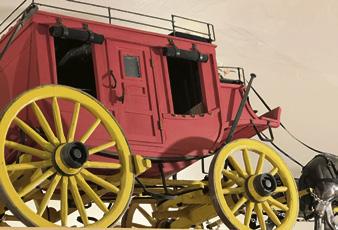
when his health dictated, he could no longer be a farmer. The meticulous nature of building the miniatures helped keep him focused and gainfully employed. On average, it took Joel 100 hours to complete one of his miniatures. In total, Joel completed 200 miniatures. He was working on number 201 when he passed away, at the age of 88 in 2009.
a road admiring his surroundings one day in 1804, he remarked that the town should be called Paradise, because its beauty made it seem like one.
The story of Paradise and its first settlers goes all the way back to Europe, to the area of the Palatinate in Germany. Here many Protestants had settled following the declaration of King Louis XIV that all Protestants in France would be persecuted. With fears of invasion by the army of France looming, many of these people decided to accept the invitation to settle in William Penn’s colony of Penn’s Woods in the New World. In 1708, Daniel Fierre (Ferree), along with his family and mother Mary, went to England to obtain citizenship papers before proceeding to New York.
By 1712, these French Huguenot settlers had secured land in Pennsylvania, in Lancaster’s Pequea Valley. They were the first
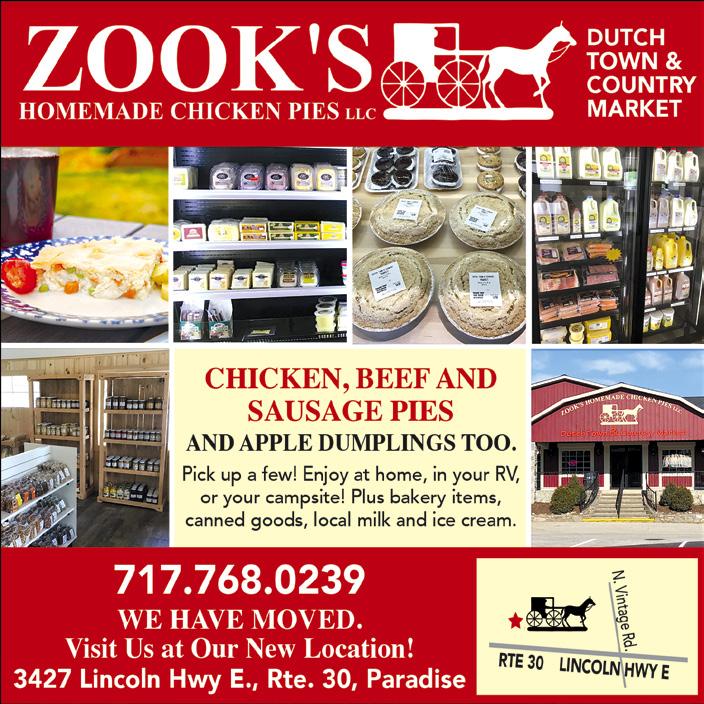
white people in the area and lived peaceably with chief Tanawa and the local Indians. Mary Fierre died four years later at the age of 63. Hers became the first grave in the family’s cemetery. If you ride the Strasburg Rail Road, you will pass her gravesite at Carpenter’s Cemetery, one of Lancaster’s oldest.
The origins of Route 30, also known as the “Lincoln Highway,” go back to Lancaster’s colonial days when this frontier county needed a communication route between it and the provincial capital of Philadelphia. At that time, the first “planned” road between Philadelphia and Lancaster was what is now Route 340. It was called the “King’s Highway,” and today we still call it the “Old Philadelphia Pike.”
As time went on, it became evident that the road could not accommodate the increasing traffic between Lancaster and Philadelphia. Since the cost of such a road was too much for the state to undertake, the company charged with building it was given the power to demand “reasonable” tolls from users. Investors received dividends earned from the tolls collected along the gates of the turnpike.
The 1792 Act went on to describe the construction of the highway, which was to be a bed of small crushed stones on top with larger stones underneath, rather than dirt, so as to prevent carriage wheels from cutting into the soil. Such a revolutionary system of road construction combined the ideas recently developed by a Frenchman and two Englishmen, one of whom was named John McAdam. We now take the term for paved roads or “macadam” from his last name. The turnpike officially opened in 1795 and was the first long-distance, hardsurfaced road in the country.
The backroads around Paradise remain beautiful to this day, as the lush greens of the summer give way to the fall colors of the harvest season. So, during your visit to Lancaster, be sure to spend a little time in Paradise.





Although thousands of visitors come to Lancaster County to experience a bit of the Amish lifestyle, the Amish are a private people and find the attention somewhat disconcerting. It is important to respect their feelings while you’re visiting. With that in mind, here are a few tips for fostering good relations between the Amish and non–Amish.









































NO PICTURES Please! Don’t ask an Amish person to pose for a picture. Most will politely refuse. It is against our Amish neighbors convictions to have their pictures taken, except in very special situations. Please respect this belief and do not take photos without permission, just as you would like to have your beliefs respected.






































































HOLD YOUR HORSES Driving along area roads, you will no doubt encounter numerous Amish carriages, or “buggies,” as visitors like to call them. Do not honk your horn, because the sound may frighten the horse and cause an accident. Instead, wait until it is safe to pass and then give the buggy plenty of room. Be sure not to cut back in the lane too sharply in front of the horse. The county’s roads are generally wide enough that you should be able to pass most buggies without much of a problem.







NO TRESPASSING Do not trespass onto private Amish property for a closer look. Amish homes are not museums, and Amish people are not exhibits. Respect their property and privacy as you would like others to respect your own. You can get a good sense of Amish life at many area visitor attractions and on guided tours.
WAVING Do not be offended if the Amish do not wave back to your friendly gesture. With all the people who wave to them throughout a day, they would be waving back all day if they did!
A FINAL WORD Remember the Amish are not on vacation and are not costumed actors. They are real people going about their daily lives. They are not here to serve as tour guides or attractions for visitors. This, after all, is their home, so please respect their beliefs and lifestyle.






























































There really is no place quite like Lititz, and everyone should plan to spend some time there while in Amish Country.
Lititz Springs Park is a popular spot for locals, and the site for many community activities. Indeed, the town’s 4th of July Celebration, begun in 1818, is reputedly the “oldest continuing community-wide observance in the United States.” The Lititz story is tied to that of the Moravian faith in Bohemia. It was in
the present-day Czech Republic that John Hus and followers founded the Moravian Church in 1457. Historians note that since this was 60 years before Luther’s Reformation, the Moravians may lay claim to being the oldest organized Protestant Church. But over the course of the Thirty Years War, its 200,000 members nearly disappeared. In the 18th century, a renewal of the Moravian Church came through the patronage of Count Zinzendorf of Saxony.
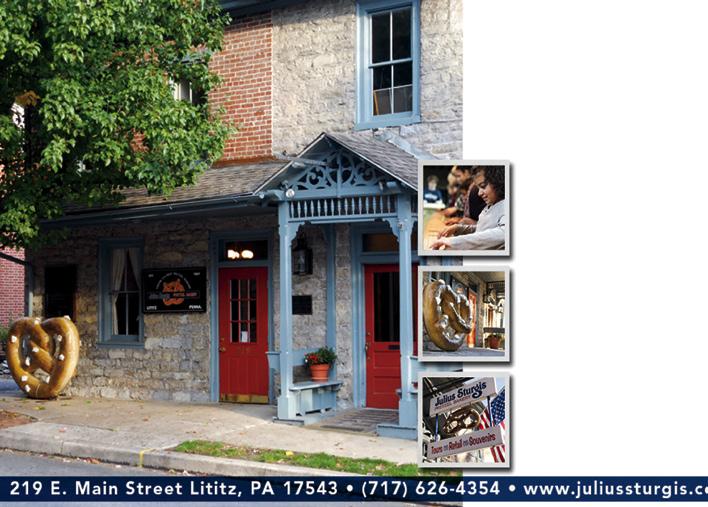


He invited all those persecuted for their faith to come to his lands in Saxony.
As was the case with other persecuted religious groups in Europe, many Moravians sought freedom by taking the perilous journey to the New World, arriving in the early 1700s, with the main settlements becoming established in Pennsylvania and North Carolina.
Missionary work was integral to the faith, and preachers were sent from the Moravian community in Bethlehem, Pennsylvania. Zinzendorf himself arrived in America in 1742. A local resident, John Klein (Kline), was so moved by hearing Zinzendorf’s preaching that he made arrangements to transfer his lands over to the Moravian community in 1755. It was in the following year that the town actually got the name of Lititz, the German spelling for Lidice, where European Moravian reformers had taken refuge in 15th century. For about a hundred years, Moravian church members were the only people permitted to live in the town. A Brothers’ House and Sisters’ House were erected for the unmarried men and women, although they did not live communally. It was not until 1855 that non-Moravians were allowed to own their own houses.
The Brothers’ House played a role in the American Revolution. George Washington ordered it used as a military hospital between 1777-78. Some 1,000 soldiers were nursed here, about half of whom died and were buried nearby.
One name is linked forever with the history of Lititz—Julius Sturgis. It was Sturgis who opened the first commercial pretzel bakery in the New World in Lititz. The year was 1861, and the site at 219 East Main Street is on the National Register of Historic Places.
A tour of the bakery is unlike any other. Inside, you get to try your hand at pretzel twisting. It’s not as easy as it looks. Guests also may see the old brick bake ovens, as well as the more modern facilities. Schedule a tour by calling the bakery at 717-626-4354.

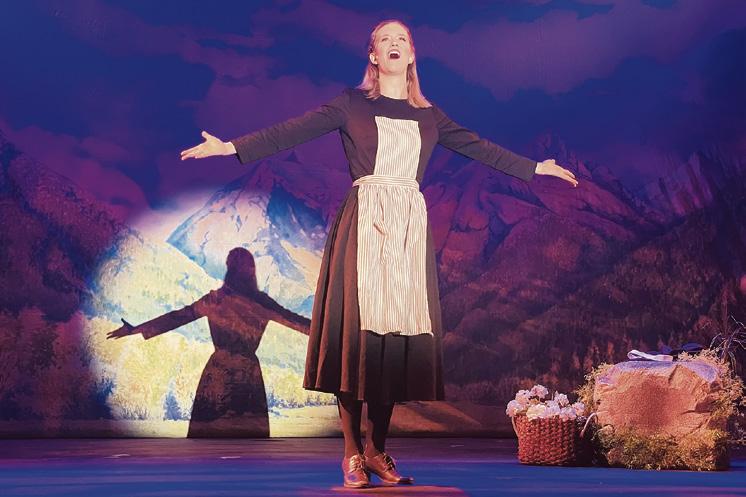
Prepare to be swept away by the timeless magic of Rodgers and Hammerstein’s The Sound of Music as Dutch Apple Dinner Theatre proudly presents a spectacular rendition that promises to enchant audiences of all ages. This endearing musical runs June 28 through August 10 and is based on the book, The Story of the Trapp Family Singers, and the 1965 film starring Julie Andrews and Christopher Plummer.
Set against the breathtaking backdrop of the Austrian Alps, the beloved musical masterpiece comes to life with a talented cast, stunning set designs, and unforgettable melodies that have stood the test of time. Follow the journey of Maria, a spirited young woman who discovers love, courage, and the power of music in the face of adversity. From the opening notes of the iconic title song to the emotional crescendos of “Climb Ev’ry Mountain,” this production of The Sound of Music will create an immersive experience that will leave audiences humming the iconic tunes long after the final curtain falls.
Artistic Director, Lauren Sobon, has assembled a stellar cast, featuring Megan Urz as Maria, and Alexander Rothfield as Captain von Trapp, and an ensemble of talented performers who bring the von Trapp family, nuns, and other favorite characters to life
with authenticity and charm. See full bios at https://dutchapple.com/shows/ the-sound-of-music/.
Get your tickets today at DutchApple.com, 717-898-1900, 510

Centerville Road, Lancaster, PA.
To arrange interviews or press engagements, please contact Nanci Jo Anderson, Marketing Manager, nanderson@dutchapple.com.


The world’s most beloved musical returns! Sing along to Do-Re-Mi, My Favorite Things, Climb Ev’ry Mountain, Sixteen Going on Seventeen, Edelweiss, The Sound of Music and all the songs you know by heart. The of JUNE 28 - AUGUST 10
Dinner & A Show At One Great Price! The Happiest Sound In All The World!


















Get Showtimes and Reserve Seats at DutchApple.com • 717-898-1900 510 Centerville Road • Lancaster, PA 17601 Enjoy Award-Winning Entertainment All Year!

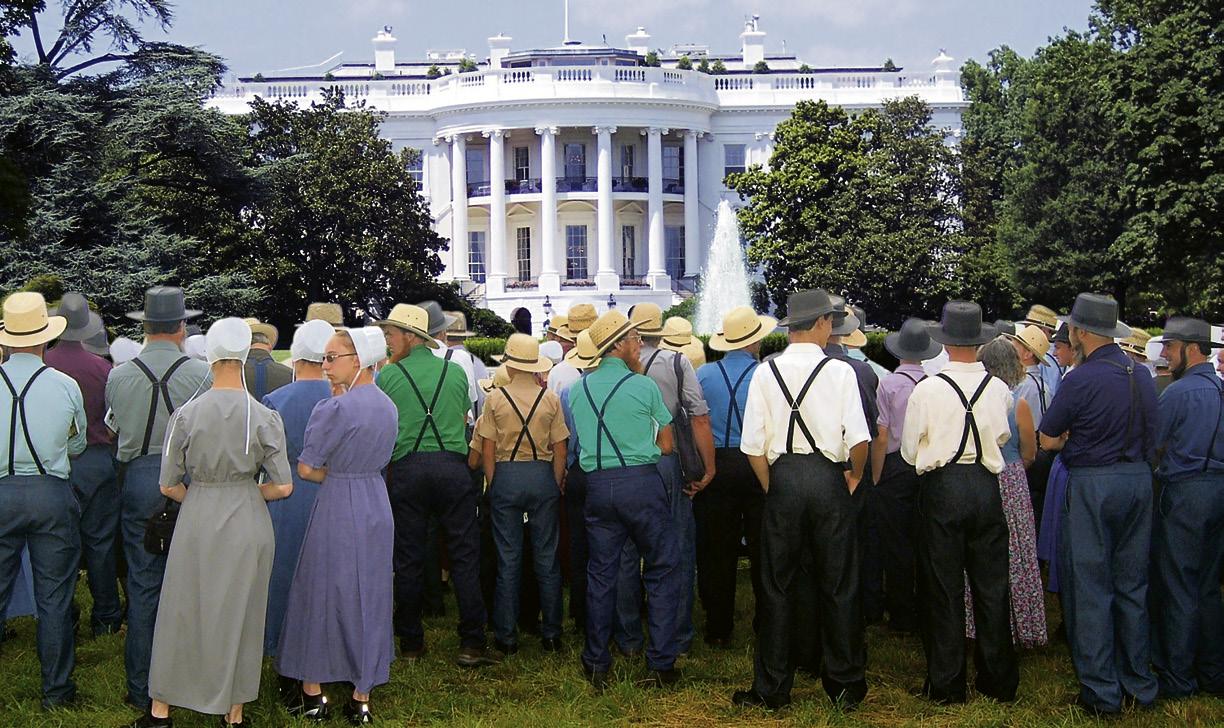
By Clinton Martin
The Amish have always had sort of an arms-length relationship with the U.S. Government. It isn’t so much that they are anti-government, or that they don’t appreciate the freedoms they have in the United States. The Amish are of course U.S. citizens, and by and large live out their daily lives amicably with their English (non-Amish) neighbors. The overall approach has been an unspoken agreement of “You do your thing. We’ll do ours. Let’s not meddle in each other’s business.”
You rarely see an Amish person getting involved in government affairs. Running for office, passing out political literature, standing on the street corner with a soap-box and a megaphone, even joining a political party to vote in the primary (Pennsylvania is a closed primary) – these are all activities that you just don’t see Amish doing. Some Amish do vote in National elections, but it is accurate to say while some do, most don’t.
The Government likewise tends to leave the Amish alone. While automobiles are highly regulated with government standards for everything

from airbags to fuel efficiency and emissions, Amish carriages (other than the orange triangle on the back intending to make slow-moving vehicles easier to see) are largely unregulated. No license plate. No registration. No insurance (required – it is available, but not required.)
So, when the Amish and the Government do have a run-in, it is front page news. The narrative often sways from one extreme to the other… the big bad government is overreaching and burdening the peaceful, innocent Amish with an unnecessarily heavy hand, or conversely, the Amish are hiding behind their straw hats, subverting civic duties everyone else has to support just because they don’t feel like following the law. Both sides of the pendulum swing are probably a little unfair, but due to the rarity of the two intersecting, the news is normally bent one way or the other.
Today, it appears one local Amish farm has gotten itself under the microscope of the Government, and not in a positive way. For anonymity’s sake, I’ve changed the name of the Amish
farmer, and I won’t name government officials, but the story itself is interesting in that it shows how the two camps approach each other in a dispute.
The “Esh” farm, as I’ll call it, has been in the same Amish family for many years and for most of that time it has been a conventional farm, growing products in the usual “industrial” manner. But, when farming this way began to favor huge, mechanized, factory-farms, the family had to do something to stay in business. So they went back to basics, farming the “old-fashioned” way. Some would say it is organic. Others would say they aren’t certified organic, but are at least farming in a more “traditional” manner with minimal chemicals, pesticides, antibiotics, etc.
Basically, the farm began selling raw milk, meats, and produce from their farm directly to consumers. Their goal as stated was “to provide authentic farm fresh, nutrient dense, non GMO, chemical free, hormone free, antibiotic free, great tasting and truly organic food employing conscientious organic standards with traditional farming methods.”
Whether it was out of a lack of knowledge of United States Department of Agriculture rules, or a more direct flouting of the rules, the “Esh” farm was producing and making available these products without following all the government rules and channels.
The government sought to have the “Esh” family adopt these practices through enforcement, but the family felt once again that to take on such practices would turn them back into a conventional farm, moving them in the direction of a mechanized, factoryfarm setting. That in their opinion was of course going against their “nutrient-dense” mantra, but would also put them back on a path of going out of business.
So, in order to be able to continue farming as they had been, they moved to a “private membership association” model. This meant that consumers who wished to source products off the “Esh” farm had to purchase a share in the farm, and essentially become a member-buyer of the farm. The “Esh” family hoped this would shelter them from USDA regulations.
In the eyes of the government, this did not change things. In court proceedings, they argued (summarizing) that the farm was an unincorporated, non-partnership, for-profit sole proprietorship farm business, and not really a true “private membership association.” The animals slaughtered at the farm are not all grown at the farm. The farm has not applied for federal inspection of its meat and poultry operations and has no current plans to apply for federal inspection of those operations.
So essentially, the Amish farm and the government are at a stalemate. Neither side is willing to budge. The “Esh” family believes they are providing foods in natural, organic, nutrientdense, pure and simple manner, and by abandoning their farming practices to become compliant with the USDA, they would be destroying the quality of the food and putting their customers at risk. The USDA believes the “Esh” family is providing unsafe, “misbranded, nonfederally inspected meat and poultry products” thus putting the public at risk.
So what happens? Who is right? Both sides are making their argument. The issue became further complicated when the USDA accused the “Esh” farm of shipping out tainted milk to a customer in Florida. The woman in Florida died of a listeria infection, which the government traced to drinking tainted raw milk, which they believe came from the “Esh” farm.
The “Esh” farm have called this a smear campaign against them by the USDA, saying that the government was using the unfortunate death of the woman (who was terminally ill with an unrelated cancer) as a way to draw their own presumed conclusions.
What I assume will happen is the two sides will come to some sort of agreement where the USDA is satisfied the public is no longer at risk, and the Amish family are able to be “in compliance” yet still offer foods they believe in. In the non-Amish world, this
is usually a simple matter of lawyers for both camps talking things through and handling the mediation process.
However, it is a bit more complicated due to a resistance among the Amish to hiring lawyers or taking the legal offensive. As it turns out the “Esh” farm has engaged legal council in order to navigate this process, so hopefully a resolution will come.
In the past, the Amish community and the United States government have had to settle disputes arising from issues such as Social Security (named “Old Age and Survivors Insurance” when it was first introduced.)
Schooling (some Amish fathers were jailed in Lancaster during a schoolstandards impasse) and most recently when the government was aiming to require purchasing health insurance or levy a fine, the Amish and the government always have been able to compromise (eventually.)
Check an issue to start your subscription. Spring (April/May) June July August September October Winter (Nov/Dec)
Amish Country News is printed seven times per year. Fantastic articles! Money saving coupons! A guide to Amish Country! For an Amish Country News annual subscription, complete this form and send a check or money order for $30 to: Amish Country News, PO Box 414, Bird-In-Hand, PA 17505 Name ___________________________________________________________________________
_____________________
(________) _____________________________________________________________________

Got great photos? Send them to us and see your photo in the pages of Amish Country News and win prizes! Visit AmishCountryNews.com for Photo Contest prizes and more info. Email your HIGH RESOLUTION ONLY photos in JPG format to clinton@amishexperience.com (minimum size 8x10 at 300 DPI). Put 2024 Photo Contest in the subject line. File names should contain your name. Include your name, address and phone number with brief details of location and subject matter in the email. No more than five photos can be submitted. LOW RESOLUTION PIXELATED IMAGES WILL NOT BE ACCEPTED. Photos become property of Amish Country News / Amish Experience and may be used in upcoming issues, publications, and promotional materials.

Ephrata, a small yet influential town, derives its name from Genesis, meaning “fruitfulness.”
With a population of 13,800, it’s strategically positioned between Lancaster and Reading, serving as the gateway to Northern Lancaster County’s lucrative manufacturing sector.
Its history dates back to the 18th century Ephrata Cloister, founded by Conrad Beissel, which evolved into a thriving village. By 1871, Ephrata was described as “a well-built country town of about one hundred and


twenty families, and very beautifully and healthily located.”
In 1848, Senator Joseph Konigmacher established the Ephrata Mountain Springs Hotel, a luxurious resort frequented by notable figures like Presidents Lincoln, Buchanan, and Grant.
A trolley system was built to connect the hotel with the town of Ephrata down the hill. At its peak, the hotel could accommodate up to 500 visitors who would stay throughout the summer.
The Reading & Columbia Railroad was completed in 1883, and the town experienced economic booms through industries like cigar manufacturing, horse trade, silk, textiles, and shoes. Downtown Ephrata once catered to all needs, from groceries to hardware.
Today, Ephrata retains its historical charm with landmarks standing as

The Concerts By The Creek July 9 • Featuring
are
or
Food Trucks and breweries onsite. No smoking, vaping or outside alcohol permitted on Borough Property. • More info: concertsbythecreek.org or 717-738-9291
• Tell them “Amish Country News” sent you!
important reminders of the borough’s history. The community’s first bank, Ephrata National Bank, still serves customers today behind its Georgian style structure designed by renowned architect, C. Emlen Urban.
Located near the town’s square sits the circa 1880’s railroad station, owned by the Ephrata Borough and serving as home to Mainspring of Ephrata, economic development corporation for the borough. The area surrounding the station has been beautifully landscaped and is known as the Whistle Stop Plaza. Many events, services and even weddings are held at this popular gathering place. The community’s Welcome Center is also located in this building. From here, visitors and residents alike can download a historic walking tour through the Uniquely Ephrata app. Recreation thrives with facilities like the Ephrata Rec Center, community pool, and the newly opened Ephrata Unleashed Dog Park. The WarwickEphrata Rail Trail and Heatherwood Bike Park offer outdoor activities, while quality education and healthcare are ensured through the Ephrata Area School District
Ephrata cont’d on page 28


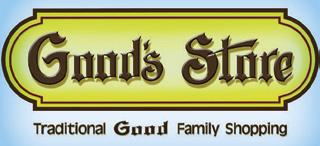

43rd Annual New Holland Classic Car Show
July 14 at 9:30 a.m. • 400 E Jackson Street, New Holland, PA • This year’s feature is the 60th anniversary of the Ford Mustang! • More info: facebook.com/story. php/?story_fbid=725044796504280& id=100069962981833&_rdr • Tell them “Amish Country News” sent you!
New Holland, settled in 1728 by John Diffenderfer of Heidelberg, Germany, is located in the fertile farmlands of Lancaster County. It is a charming small town similar to many towns in rural America, but its story goes back to well before the founding of our nation.
The unstable situation in Europe in the late 1600s spawned and nurtured the pioneer interest in the deep forest lands of Pennsylvania—60 miles inland from Philadelphia. In 1681 William Penn received his 40,000 square-mile land grant to settle King Charles’ debt to his father. The area now called New Holland was practically covered by virgin forests—sturdy timber of oak, ash, chestnut, and walnut.
By 1728, William Penn, had been dead for 10 years and his American colony, called Pennsylvania and was being administered by a proprietary governor while the sale of land was formalized by patent deeds. In the case of one of the town’s early settlers, John Diffenderfer, the record shows that he applied for land to live on in 1728. It was surveyed and placed on the county map in 1735. The deed was finally issued to him on March 22, 1758 after 30 years!
The village founders were German, not Dutch. They were surrounded by English and Welsh Quakers, Episcopalians, a few Swiss-German Mennonites and some Scotch-Irish Presbyterians. The Amish arrived later.
The town was once known as New Design, a name given by
Michael Diffendefer for his real estate development in 1750. But in 1802, when a post office was established and an official name was necessary, there was no dissension to naming the town New Holland. These grateful people remembered how extremely kind the inhabitants of Holland were to them when they fled persecution and sought religious freedom in the New World.
New Holland was laid out as a “street town” in the typical European style of having the villagers live in a central location along both sides of the street,
but each having an outlying plot of land to cultivate as an adjunct to his trade as a craftsman. Even today, the main street of New Holland has major “kinks” or bends in it. Unsympathetic visitors claim it looks as if the town were built along a “cow path.” But if one looks with a discerning eye, the street also follows the high ground. The land on the ridge was the driest, and in winter it would be blown clear of much of the snow. These settlers made the obvious facts of nature work for them rather than against them, offering a lesson for us all even today.
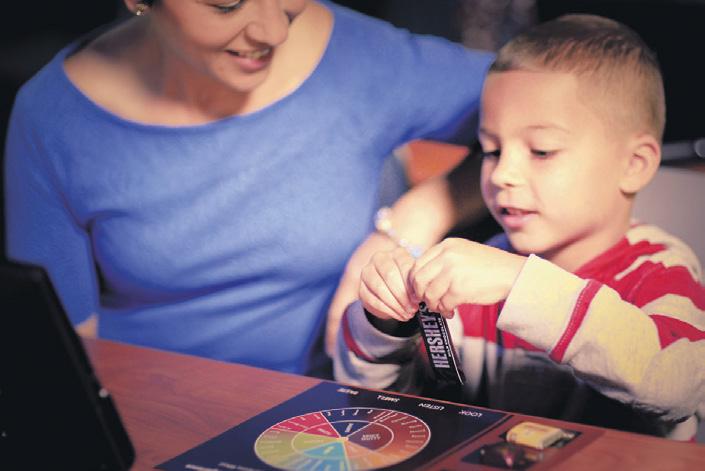






Bird–in–Hand Pg 36
Intercourse Pg 34
Paradise Pg 11
Strasburg Pg 32
New–Holland | Blue Ball Pg 29
Lititz Pg 24
Ephrata Pg 28


The area we know today as Strasburg was first settled by German-speaking Swiss Mennonites. After bargaining with William Penn in London, they came directly to Philadelphia from the Rhineland, arriving in September of 1710, on board the ship Maria Hope with a combined passenger and crew list of 94 persons. Thirty-six of the leaders were granted patent deeds from Penn’s property commissioners for 14,000 acres of land surrounding


Strasburg. Some of the family names are familiar to locals today, including John (Hans) Herr, whose house in Lancaster County is open to visitors and remains as the county’s oldest surviving dwelling (1719).
French fur traders opened up the first path through this area from Philadelphia to the Susquehanna River—known as “Minqua’s Path.” As early as 1716, when the first Conestoga wagon was used for hauling goods between Philadelphia
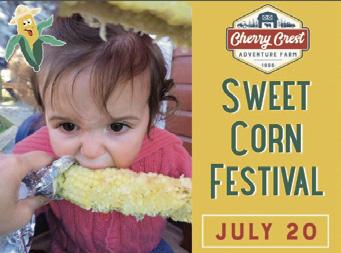
Sweet Corn Festival
July 20 • Cherry-Crest Adventure Farm, 150 Cherry Hill Road, Ronks, PA • This Sweet Corn Festival will feature specialty sweet corn menu items, corn crafts, & corny games. Along with live music, local wine & craft beers. Plus, you don’t want to miss the sweet corn eating contest. Whether you’re chomping your teeth as a contestant or clapping your hands as a spectator it’s sure to be a sweet time! • More info: cherrycrestfarm.com/thingsto-do/festivals or 866-546-1799 • Tell them “Amish Country News” sent you!
and Lancaster County, it became known as the Conestoga Road.
During the next half century, traffic on this road increased considerably— and Main Street Strasburg was developed. The first buildings appeared in the village about 1733. Strasburg flourished in the 18th century primarily because of its location along the major wagon routes between Philadelphia, Lancaster and the Susquehanna River. Strasburg was one of the principal stopping


Enjoy a guided tour of Lancaster County’s Amish Country. Strasburg Scooter Tours is an award-winning, Lancaster County, PA outdoor attraction that highlights the beautiful landscapes that surround the local Amish communities. Hop on a scooter or slide into your scoot coupe and get ready to ride alongside some of the most beautiful countrysides that Lancaster has to offer. You’ll pass by Amish riding horse and buggies, see beautiful rolling farmlands, Amish farms, and a whole lot more.
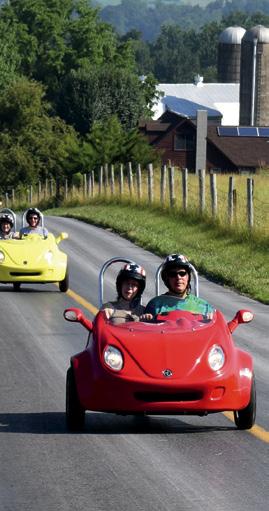

stations and, with the heavy wagon traffic, there were as many as ten taverns here.
No doubt the religious nature of the first settlers was responsible for the village becoming a center for worship and education. In 1816, when the village was incorporated into a Borough, the name Strasburg was selected, undoubtedly named for the Cathedral City from which the Swiss Mennonites came, the Alsatian city of Strasbourg.
Wealthy doctors and clergy, and an interest in worship and education, made Strasburg a cultural and educational center for the region. The first formal school opened in 1790, a classical academy where Greek and Latin were taught.
These academic enterprises were followed during the 19th century by a flood of schools. In 1823, by an act of the Legislature of Pennsylvania, an


Academy was established in which “the languages, arts, and sciences will be taught.”
The year 1839 marked the founding of the Strasburg Academy at 37 East Main (the present day Limestone Inn Bed & Breakfast was the headmaster’s home and housed boarding students). The Academy gained the reputation of being one of the best academies in the country for both boarding and day students, and its students came from all over the East Coast and as far away as Cuba and Puerto Rico.
In 1841, a classical school for girls, the “Strasburg Female Seminary,” opened at 17 East Main. Such a school for girls was quite unusual at that time.
As Strasburg flourished, so did its neighbor to the east, Philadelphia. The commercial interests of Philadelphia pressured the State Legislature to



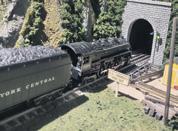
improve the transportation network into their city. As a result, an internal improvements bill passed in 1826 to construct a series of canals. The Philadelphia and Columbia Rail Road was also incorporated with financing provided by the state.
With these undertakings, Strasburg residents became alarmed at the possibility of losing their commercial position and from this concern emerged the Strasburg Rail Road. In 1832 a charter was secured from the Pennsylvania Legislature to construct a rail line connecting Strasburg with the Philadelphia and Columbia Rail Road main line near Paradise. Due to financial difficulties, the project was delayed until finally put in running order in 1852. But this shortline between Strasburg and Paradise was not financially successful for many reasons, until it was revived to provide rides to visitors on authentic steam locomotives, thus becoming the focal point for all of the town’s train attractions.
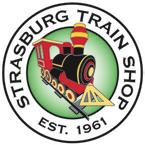
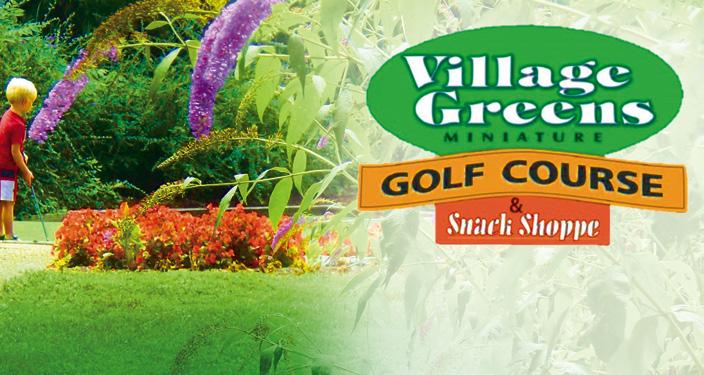





Probably no other town in Amish Country can claim its fame is owed largely to one simple thing—its name. For years people have sent letters home with the name stamped boldly on the envelope… Intercourse, PA. There are several explanations for the name, and they are woven into the brief history that follows.
In the beginning, of course, there was very little here, just settlers arriving in the New World from Europe. Back around 1730, the Old Provincial Highway (or Old Philadelphia Pike,
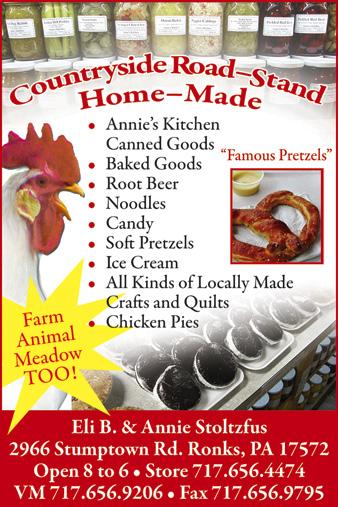

Route 340) was laid out to connect Philadelphia with the inland town of Lancaster. Conestoga wagons, pulled by six to eight horses, hauled supplies and freight back and forth between the two cities. Providing rest for travelers and horses, taverns sprouted along the way, becoming centers for news, gossip, and business transactions.
And that is how the town got started when the first building, a log tavern, was constructed in 1754. The Newport Road, a former Indian trail, came from Newport, Delaware to the south, and it is believed that because
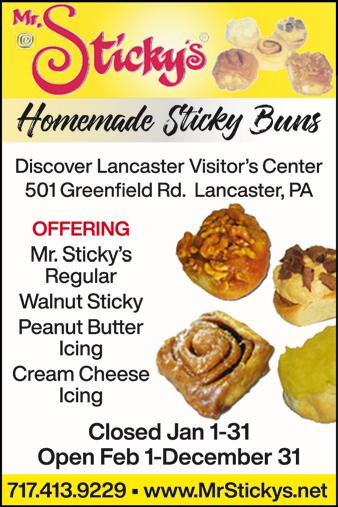

Come with me and you’ll be in a world of pure imagination!
June 14–July 21 • Make it a point to see the Roald Dal’s stage presentation of Charlie and the Chocolate Factory! Then tap your feet to catchy tunes, witness incredible inventions, and be transported by the magic of Wonka’s factory. From golden tickets to Oompa Loompas, this adventure overflows with fun for the whole family! • More info: thefulton.org/ or 717-397-7425 • Tell them “Amish Country News” sent you!
of these intersecting roads the tavern took “Cross Keys” as its name.
That was true at least until 1814, when it was named Intercourse in a real estate scheme to establish a more sizable town. George Brungard had acquired 48 acres of land north of the roads in 1813. He attempted to lay out a town site and divide it into sections for sale by a lottery, advertising “151 handsome building lots of $250 each to be drawn for by number.”
The newspaper advertisement stressed “the great importance of so many turnpikes and great leading roads intersecting at and near this place.” As one writer has noted, in those days “intercourse had a common usage referring to the pleasant mutual fellowship and frequent intermingling which was so much more common in the informal atmosphere of the quiet country village of that day.” There was no hesitancy on the part of the United States Post office Department to accept the name ‘Intercourse’ since it meant a commercial or trading site.
But back to our story and Brungard’s scheme. Although lotteries had been used for many years to sell various things, his real estate lottery failed, and most of the land was combined into one tract. More recently, in 1971, another person tried to take advantage of the town’s name and sell one-inch square
plots of property to visitors. This plan proved to be a flop as well.
In the old days, there were only five houses, counting the inn, and the town grew slowly. But by 1880, Intercourse had 54 homes and a population of 280. Communications improved with the arrival of the post office, and later the telephone.
Getting the first post office up and running was a difficult matter. The main problem was finding a building and someone willing to perform the duties of a postmaster. The first, Benjamin Fraim, performed his duties from the Cross Keys Tavern, and may have had a job working there, since “his income, based on a percentage of the postal transactions for the year ending 1829 was only $8.21.”
Over the years the post office moved among stores or restaurants whose owners hoped visits by residents would increase their business.
The local stagecoach service apparently started around 1898. It was “a single horse conveyance similar to a market wagon, with a rollup curtain and double set of seats.” The stagecoach brought items from Lancaster City for local Intercourse businesses, and even picked up milk, butter, and eggs for delivery to Lancaster restaurants and industries, including an ice cream plant. One history of Intercourse notes that when it snowed, a bobsled was used instead. “When the driver knew of passengers beforehand, their comfort was added to by many a hot
brick heated the night before in the oven, and wrapped in newspaper to preserve its warmth.”
As the days of the dirt road drew to a close, so too did the stagecoach days with the Rowe Motor Truck service started by Coleman Diller in 1910. In 1923 the Penn Highway Transit Company was organized and initiated bus service to Lancaster. It is noted that “many of the Amish residents of the area were anxious to see the line started, but did not care to subscribe to stock. Instead they liberally bought books of tickets which were really prepaid bus fares.” By 1924 enough money was raised to buy a Mack Auto Bus for $6,800. It held 25 passengers and even had solid rubber tires!
Since the town never really got to be “too large,” it has retained much of its sense of community, from the little public library in a former one-room school to the volunteer fire company. Surrounded by farms, the town has grown little and retains much of its former charm, even when thousands of visitors descend upon it during the tourist season.
Many residents and visitors enjoy the atmosphere of this small town, a place where family, community, religion, and hard work are still important values. The village of Intercourse has certainly changed over the years, but it has changed slowly, and “sometimes the things that grow the slowest are the ones that endure the longest.”
Ephrata cont’d from page 28
and award-winning Wellspan Ephrata Community Hospital.
Municipal services include police, code enforcement, and utility management, with the borough’s own electric company providing power.
Ephrata is experiencing some significant revitalization that will secure a vibrant, healthy town for future generations. The borough, under the auspices of Mainspring of Ephrata, completed a walkability project in the downtown area that enhanced pedestrian safety, and launched a Façade Improvement Grant Program and Revolving Loan Fund Program to improve aesthetics and help businesses to expand. The borough continues to strengthen the economy by promoting available leased space within commercial properties, attracting specialty retailers, and preserving historic buildings.
The borough’s commitment extends to preserving natural assets like the Ephrata Mountain, exploring plans for hiking trails and conservation easements to enhance community living. It is from this 200 acres of public wooded land that the healing waters flowed all those years ago to the Mountain Springs Hotel.
Ephrata continues to thrive as a fruitful community, blending its rich history with modern amenities for residents and visitors alike.
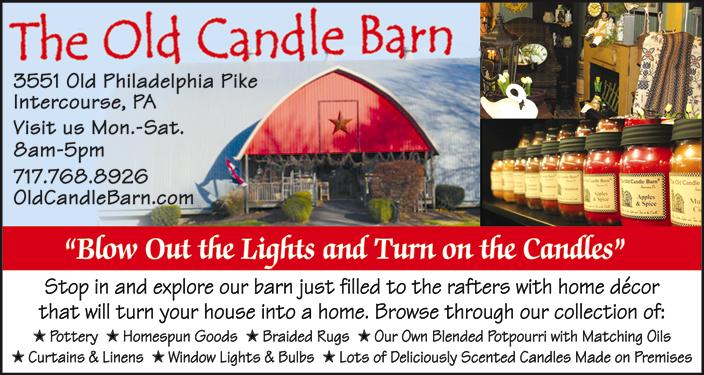

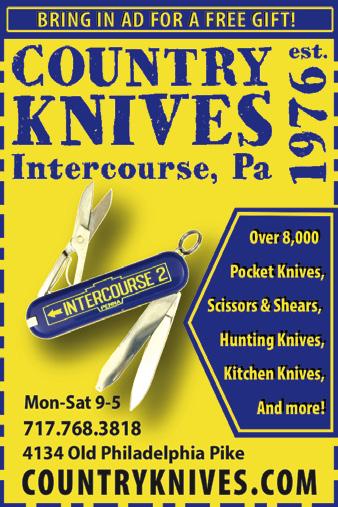

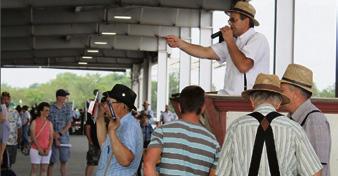
Of the many unique village names that dot the Amish Country map, one of the more interesting is Bird-in-Hand.
The story of the town of Bird-in-Hand is as colorful as the name itself. To be


correct, the town is really a village since it has no governing body. When Bird-inHand celebrated its 250th Anniversary (1734 – 1984), a commemorative booklet was put together. It outlined a brief history of the town…
William Penn, an English Quaker, had founded the colony of Penn’s Woods (Pennsylvania), and settlers began arriving from Europe in the early 1700s, moving westward from the port city of Philadelphia. English Quakers and Swiss Mennonites were the early settlers. The Quakers built a meetinghouse
and two-story academy, which stands today, next to the fire company. But over the years, the Germans “made the greatest lasting impact.”
A friendly relationship existed between the early settlers and the Shawnee and Conestoga Indians, who were the area’s first inhabitants. They taught settlers how to deaden trees, use deerskin, prepare corn as food, and use medicinal herbs.
“When the Old Philadelphia Pike became a well-established route of transportation for those traveling west to the Alleghenies, Lancaster became known as the gateway to the west.” The trip by stagecoach for passengers, or Conestoga wagon with freight and merchandise, lasted several days. Inns were built every few miles, identified with signs held by an iron pole or attached to the side of the building.



The reason for these signs was twofold. First, they could be understood by all nationalities. Secondly, many teamsters or waggoneers were poorly educated and could not read. If they were given orders to stop at a certain inn, they could do so by recognizing the artwork on the signboard.
The old legend of the naming of Birdin-Hand concerns the time when this pike was being laid out. Legend says that two road surveyors were discussing whether they should stay at their present location or go to the town of Lancaster to spend the night. One of them said, “A bird in the hand is worth two in the bush,” and so they remained. The sign in front of the inn is known to have once “portrayed a man with a bird in his hand and a bush nearby, in which two birds were perched,” and soon was known as the Bird-in-Hand Inn.
The original hotel was destroyed by fire about 1851. By the following year, a
* Aaron & Jessica’s Buggy Rides (s) 4-5
* Amish Country Homestead & Fisher Amish Schoolroom (s) .......................... 18-21
* Amish Country Tours (s) 18-21
* Amish Experience Theater (s) 18-21 Amish Visit–In–Person Tour (s)
three-story hotel was built to replace it. More recently, it was known as Bitzer’s Hotel before becoming the present Village Inn of Bird-in-Hand, now on the National Register of Historic Places. The Historic Preservation Trust of Lancaster County noted that it “may be one of the few 19th century inns in the context of a small town in Lancaster County, which survives with a high degree of architectural integrity.”
The town post office was established in 1836 as the Enterprise Post Office.
“Enterprise” was then the official name of the town, until the final change back to Bird-in-Hand in 1873.
After a large fire in 1896, people discussed the need for a fire company. In the early days, hitting a circular saw alerted the men of a fire. The year 1916 saw the change from horse-drawn to motorized fire equipment. Today the Hand-in-Hand Fire Company remains a volunteer organization, famous for its delicious fund-raiser dinners.

Beautiful Golf Courses • Petting Zoo Fish and Duck Pond • Hand Dipped Ice Cream

N. Ronks Road Bird-in-Hand, PA (Located behind Bird-in-Hand Family Restaurant)



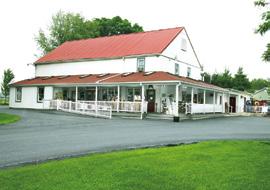
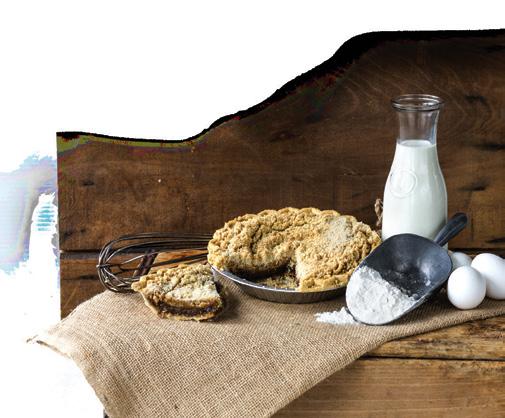



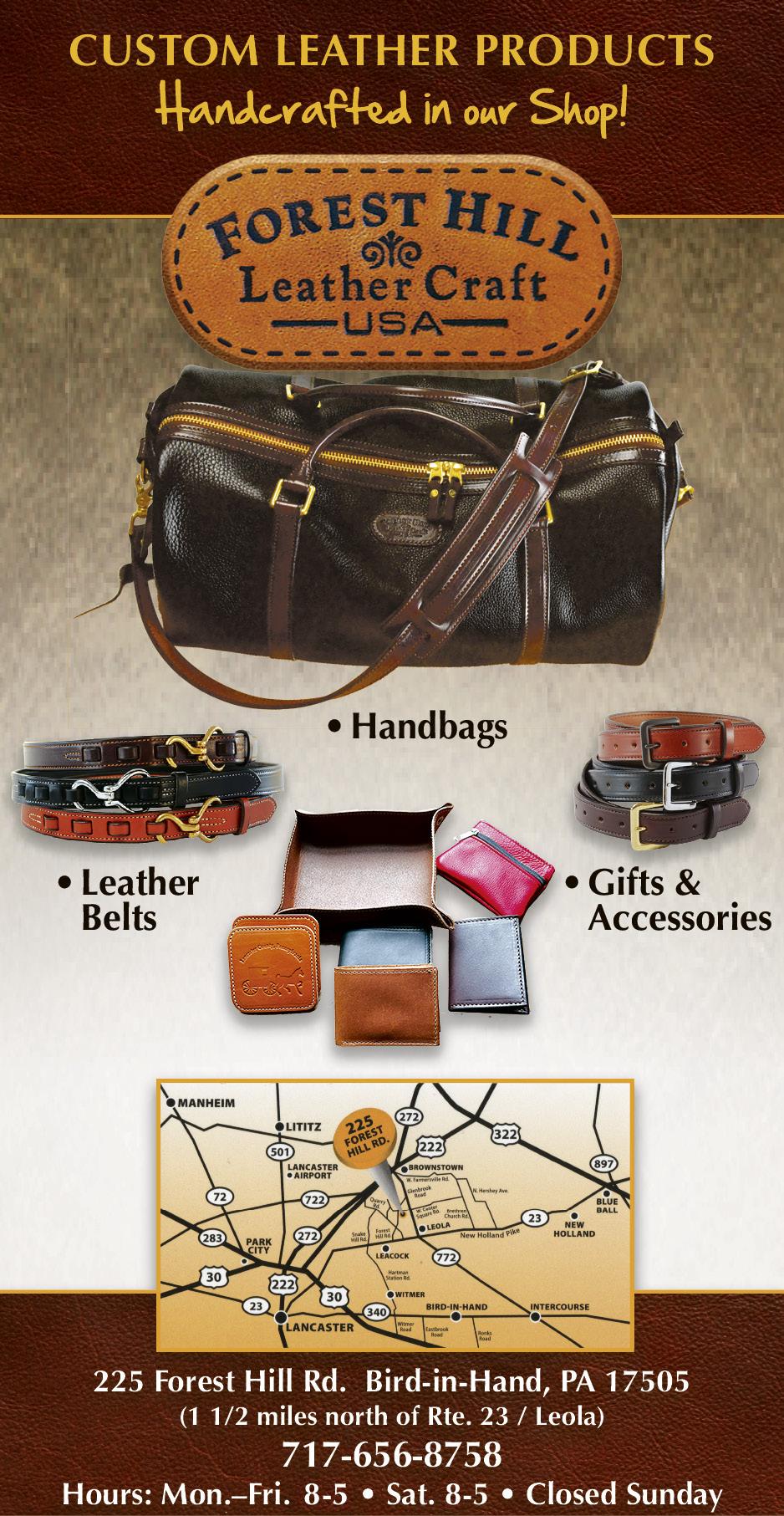

The town of Bird-in-Hand remained relatively unknown until a musical called PLAIN & FANCY opened in New York. The show Playbill noted that “The action takes place in and around Birdin-Hand, a town in the Amish country of Pennsylvania.” The cast was brought to Bird-in-Hand on January 17, 1955, prior to the official opening.
Today, the town of Bird-in-Hand is still small, said to have a population of only about 300 people. On any given day, there may be more visitors than inhabitants. Many are city folks who have come to enjoy the country atmosphere, history, and shopping. It is said that visitors “can still expect friendly shopkeepers, homegrown Lancaster County foods, and restful lodging for weary travelers.”

By Clinton Martin
The all-around, standard Amish carriage appears to have changed very little in the last 100 years. But, if you get up close and really look at a contemporary Amish carriage, you’ll see that innovation is woven into every aspect of the vehicle. From a distance, sure the

colors are the same. The shape is the same. But functional aspects of carriages have been nothing short of revolutionary in recent years.
Lighting options abound, with LED lights being popular (and practical.) Air bag suspensions offer a far softer ride than old leaf springs. New brake technology makes the carriages safer, and the brakes last longer. And, just when I thought I’d seen it all, a new invention that the discerning Amish driver just has to consider…
Powerlift Buggy Steps. It is a buggy step that is attached to an actuator that travels up and down. Thus, older, or mobility-impaired riders can be aided up into the buggy. The actuator draws off the battery, which is already
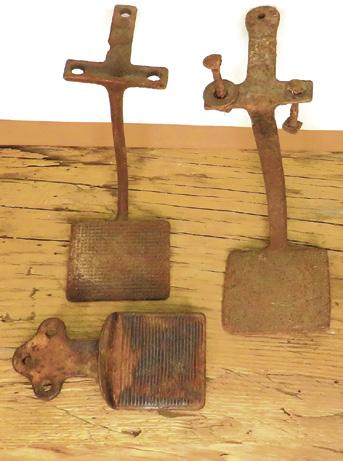


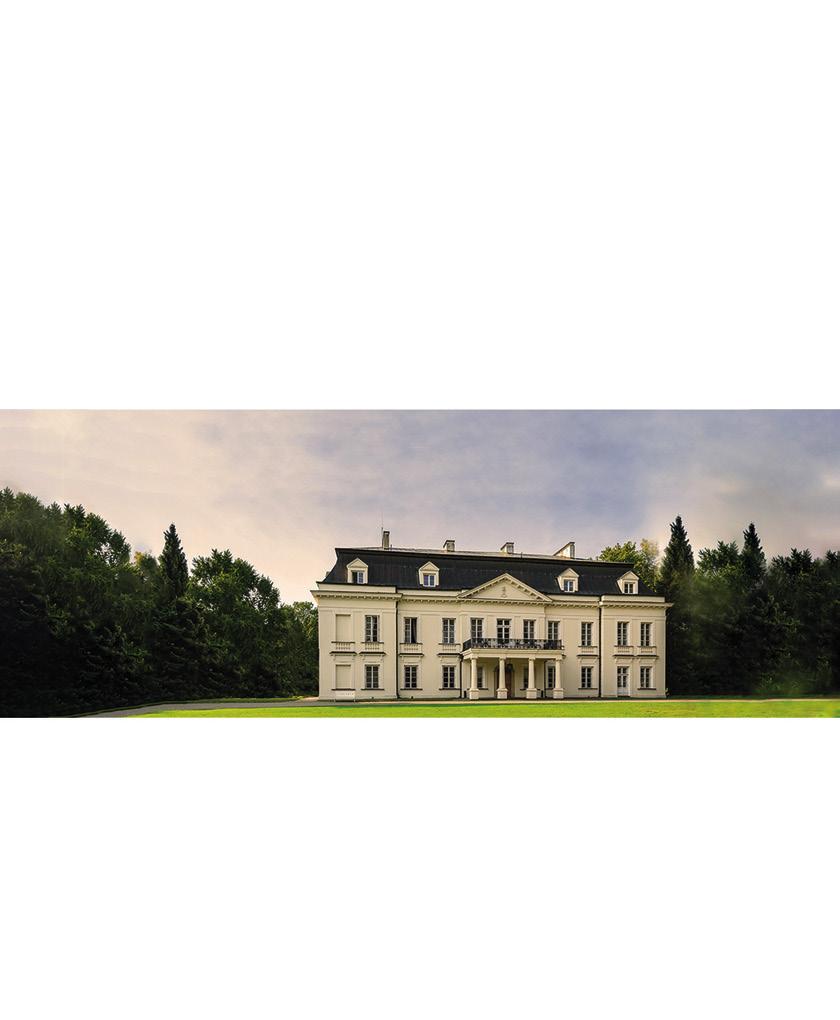


By Edward Blanchette
Aaaah, Summertime… Long hot days, Family Vacations & Barbeques, and Ice Cream! Yes, Summers & Ice Cream, they go perfectly together. And ice Cream is the one thing that can assist in taking the edge off from the heat of the day, topping off the end of a great meal, or to just put a smile on a child’s face. Whether you’re nine months or ninety years young, it’s Ice Cream that brings the biggest smile of approval, hands down! Definitely the go-to for most people this time of year. And why not? This frozen treat comes in a multitude of flavors, colors, and sizes. Not to mention a variety of ingredients to satisfy even the pickiest of consumers. From hard scooped to soft serve that create the Banana Splits, Hot-Fudge Sundays, your favorite flavored shake, to even the simplest vanilla cone {be it waffle cone or standard}, Ice Cream has certainly come a long way from its meager beginnings.
It’s believed that the precursors to Ice Cream originated as far back as “2700 BCE”. It is also believed that “early” Ice Cream was also created during the Tang Dynasty of China (618 to 907 CE), the iced milk that had been so popular in earlier dynasties had become a widespread delicacy. But in America, the first Ice Cream Parlor was believed to have been opened in New York City in 1776. American colonists were

the first to use the term “Ice Cream”. The name came from the phrase “iced cream”, which was similar to “iced tea”. The name was later abbreviated to “Ice Cream”, the name we know today*. From there, the many innovations for this frozen treat took off**.
• In the 1840s the first ice cream churn was invented.
• In 1851: the first ice cream plant was opened.
• In the 1880s the Ice Cream Sunday was born.
• In 1904: The first waffle cone made its debut at the “World’s Fair” in St. Louis, MO.
• In 1970: A man named H.P. Hood introduced a soft-serve frozen dessert, first served on the US’s east coast to limited success in the 1970s, dubbed the name “Frogurt”.
• In 1978: Brigham’s Ice Cream Shop in Boston developed and introduced the first packaged frozen yogurt under the product name “Humphreez Yogart”.
• In 1980-81: The first patents for Lactose-reduced ice cream and process for the production of and for this specific creation of Lactosereduced Ice Cream was created***.
Now, with all of the technology and the sophistication that Ice Cream is
today and with the average American consuming approximately 19.7 pounds of ice cream annually. Though the majority of ice cream may be sold through grocery stores, and not restaurants****, we still have our favorite spots to frequent and go to, to indulge ourselves with this awesomely delicious — frozen tasty treat, be it with friends & family, or just by yourself. It’s always a welcomed & tasty escape. In “Amish Country” there are certainly a bunch of locations that serve or sell that frozen treat, that is Ice Cream. But I would be a miss, if I did not mention the additional prime locations to the Ice Cream Shops that also serve this “Dairy Treat”. That being the multiple Dairy Creamery locations that dot the landscape of Lancaster County and the

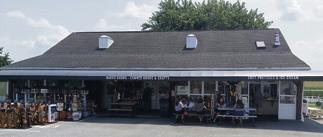
Countryside Roadstand
2966 Stumptown Road, Ronks, PA 717-656-4474
See ad on page 34
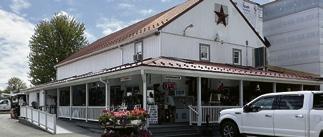
Bird-In-Hand Bake Shop 542 Gibbons Road, Bird-In-Hand, PA bihbakeshop.com 717-656-7947
See ad on page 37

Crystal Cave
963 Crystal Cave Road, Kutztown, PA crystalcavepa.com 610-683-6765
See ad on page 29
counties that surround all that is “Lancaster Pennsylvania”. From milk, cheeses, to Ice cream. You can usually find all of your dairy needs in these locations that specialize in all-things dairy. And in some, you might even find a bit more farmland treasures, that being baked goods and some local produce. Routing out any other remaining cravings or needs you may have, to what one might perceive as a one-stop shopping experience.
As we wind down our summer, remember to look for and support these
unique small businesses if you can, especially after a difficult few years of community & business disruptions due to world events and recognize how special those businesses are in our hearts and for what they have to offer to our communities with their special contribution. Listed are a number of locations where you might go. As our summer soon comes to an end and you travel through “Amish Country” feeling the need to indulge those cravings and enjoy a cool refreshing & tasty treat, that is of course…Ice Cream.
*Google – History of Ice Cream – manyeats.com/history-of-ice-cream/)
**Google – History of Ice Cream – www.thoughtco.com/history-of-ice-cream-1991770) ***Google – US4374861A – patents.google.com)
****Kristin Runge, UW-Extension: kristin.runge@ces.uwex.edu; Twitter@RungeKristin)
Image source: “Realistic drip ice cream melt drops with sprinkles “ by upklyak / Freepik

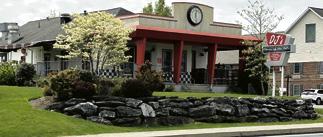
DJ’s Taste of the 50’s 2410 Old Philadelphia Pk, Lancaster, PA discoverlancaster.com/directory/djstaste-of-the-50s 717-509-5050
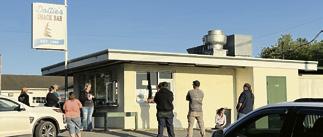
Snack Bar 425 West 4th Street , Quarryville, PA 717-786-7274

Freeze & Fizz Drive-In, LLC
2250 New Holland Pike, Lancaster, PA freezeandfrizz.com 717-656-4491


Maplehofe Dairy
799 Robert Fulton Highway, Quarryville, PA maplehofedairy.com 717-786-3924

Down on the Farm Creamery
509 May Post Office Rd, Strasburg, PA 717-687-7829 facebook.com/people/DownOn-The-Farm-Creamery/100046564224058



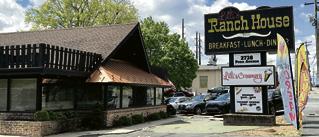
Lilli’s Ranch House & Creamery 2738 Penn Ave, West Lawn, PA lillisranchhouse.com 610-678-6282


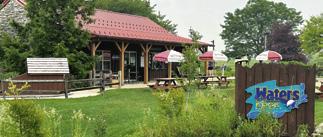
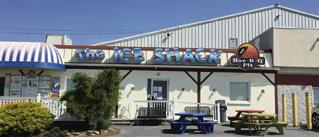

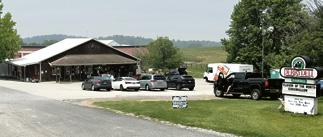
Perrydell Farm & Dairy 90 Indian Rock Dam Road, York, PA perrydellfarm.com 717-741-3485
PO Box 414 • Bird–in–Hand • PA 17505 717.768.8400, ext. 217 amishcountrynews.com
Published by Dutchland Tours Inc. Clinton Martin, Editor–in–Chief clinton@amishnews.com
For advertising information contact Edward Blanchette Director of ACN & Business Development ed@amishnews.com • 717.344.0871
Tammy Johnson, Graphic Designer
290,000 copies distributed annually by subscription, and over 200 hotels, motels, information centers and businesses in pa Dutch Country. Copyright © 2024 All contents of this magazine are protected by copyright and may not be reproduced without prior approval of the publisher.

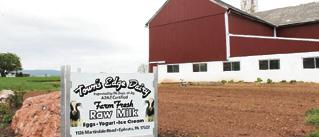
Patches Family Creamery 201 Fonderwhite Road, Lebanon, PA patchesfamilycreamery.com 717-273-1983 Town Edge Dairy 1126 Martindale Road, Ephrata, PA thefamilyfarmresource.com/farms/ towns-edge-dairy 717-445-0173
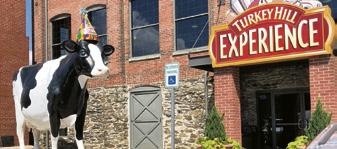
Turkey Hill Experience 301 Linden Street, Columbia, PA turkeyhillexperience.com 717-684-0134 See ad on page 7


2900 Oregon Pike, Lititz, PA oregondairy.com 717-656-2856
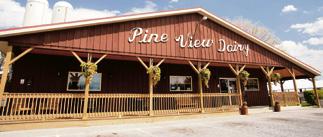
View Dairy 2225 New Danville Pike, Lancaster, PA pineviewdairy.com 717-872-5486
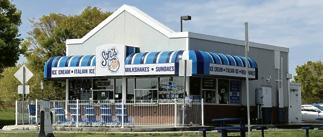


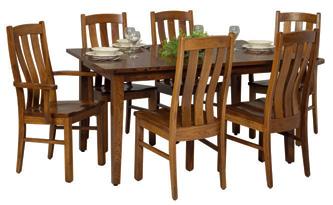


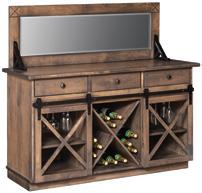







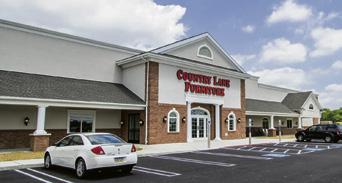






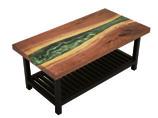


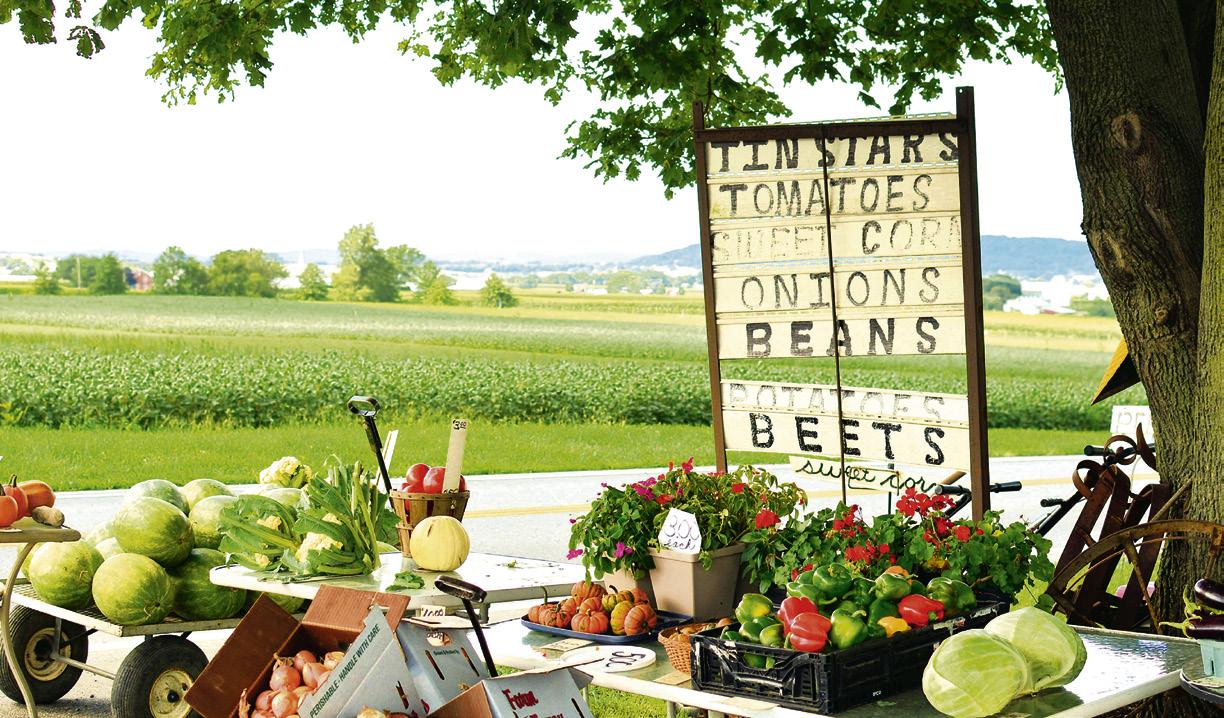
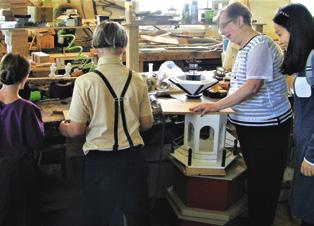
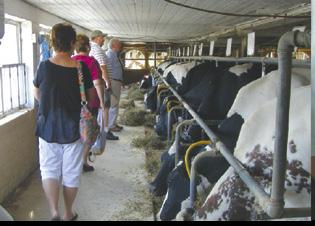
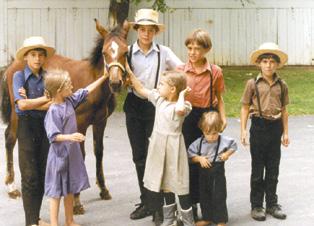
Amish Visit-In-Person Tour (3 Hrs.)
$61.95 adult, $51.95 child (age 6-12*)
* Children under age 6 not permitted on VIP Tour
Stop 1: The Amish Farm Observe the milking process and discover “Amish electricity” as you learn that the Amish do not milk cows by hand.
Stop 2: Amish Cottage Industry As the Amish population grows, more Amish turn to home businesses rather than farming. Visit an Amish workshop to see what they make and how they make it.
Stop 3: The Amish Home We’ll go to the home of one of our Amish neighbors for friendly conversation…a chance to sit, chat, and visit the Amish way.
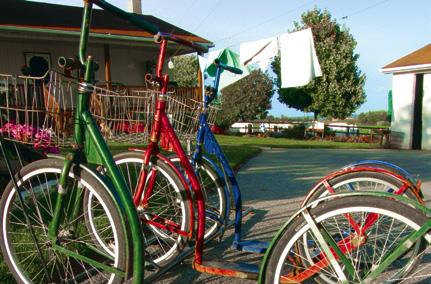
Enjoy a 3–HOUR Experience featuring a traditional Amish Family-Style Meal, served in an Amish home.
$65.95 per person regardless of age*
* Small children must be in a car seat you provide.